Damcyan Name
When you enter the castle in the desert for the first time, the text box says “Damcyan Castle” in Japanese and just “Damcyan” in English:
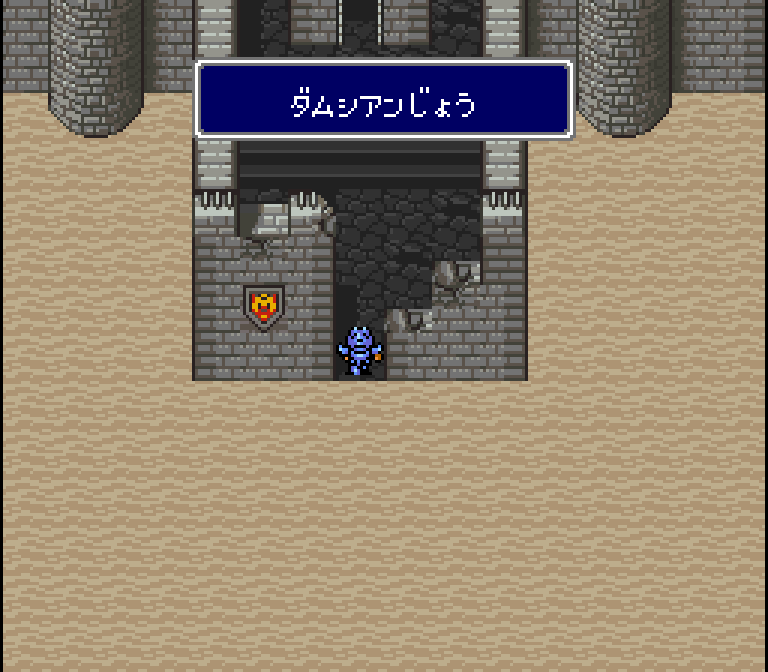 | 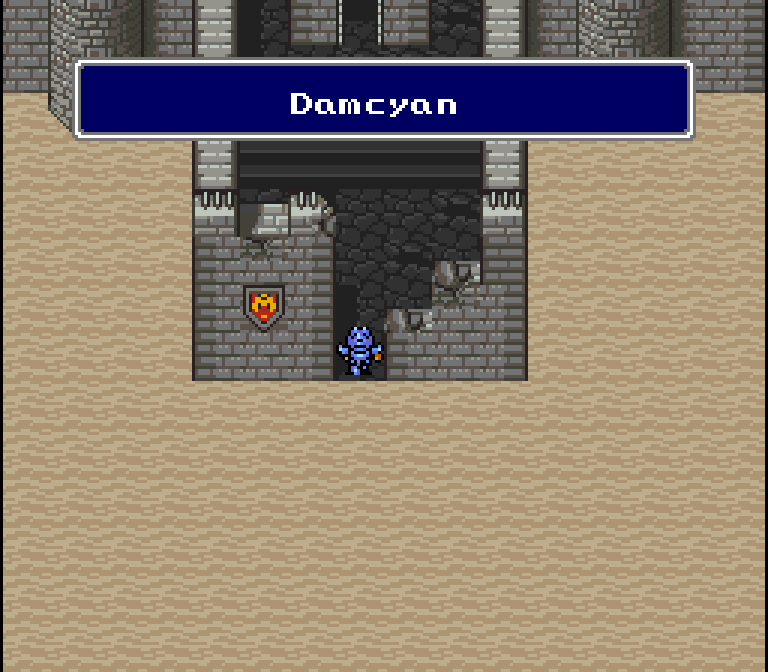 |
| Final Fantasy IV (Super Famicom) | Final Fantasy II (Super NES) |
This reminds me of how Baron Castle was reduced to simply say “Baron” too. But in this case it’s not a big deal since there’s no town also named Damcyan.
Incidentally, according to the Japanese text, “Damcyan” is pronounced something along the lines of “dam-see-ahn”. If you want to say “in” instead of “ahn”, that’s probably fine too. The key thing is that the “c” is pronounced like an “s” and the “y” doesn’t rhyme with “why”.
Bombarded Soldier
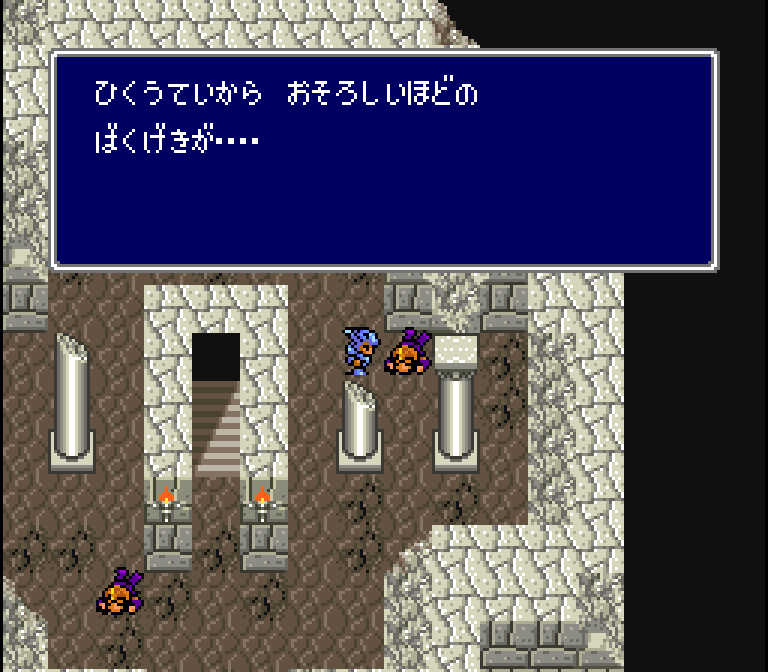 | 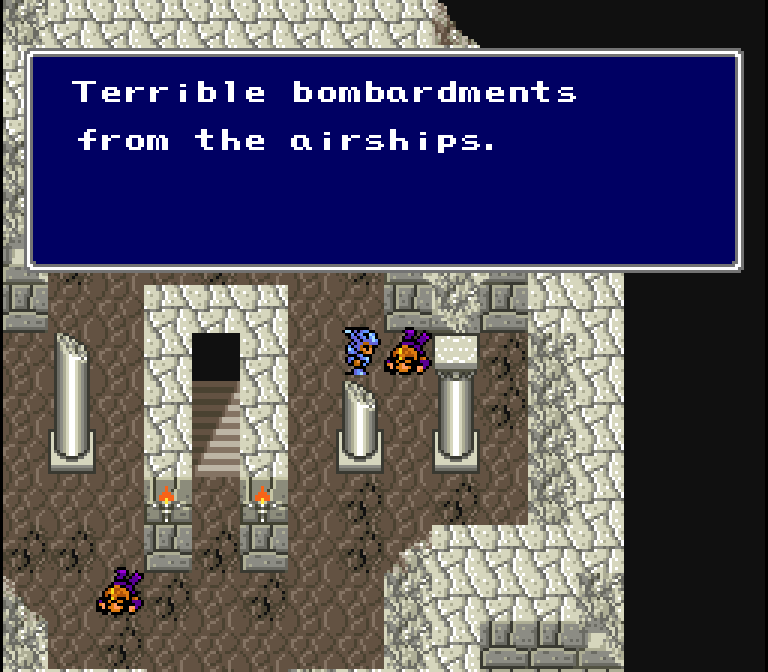 |
| Final Fantasy IV (Super Famicom) | Final Fantasy II (Super NES) |
There’s nothing wrong with the translation of this soldier’s text when he says, “Terrible bombardments from the airships.” in English. I just think it comes off a little odd with that punctuation, rather than the ellipsis that the Japanese text has.
It’s not much, but even a difference in punctuation can lend translated text that sense of, “This doesn’t quite seem like normal English…”
Recovery Pot Soldier
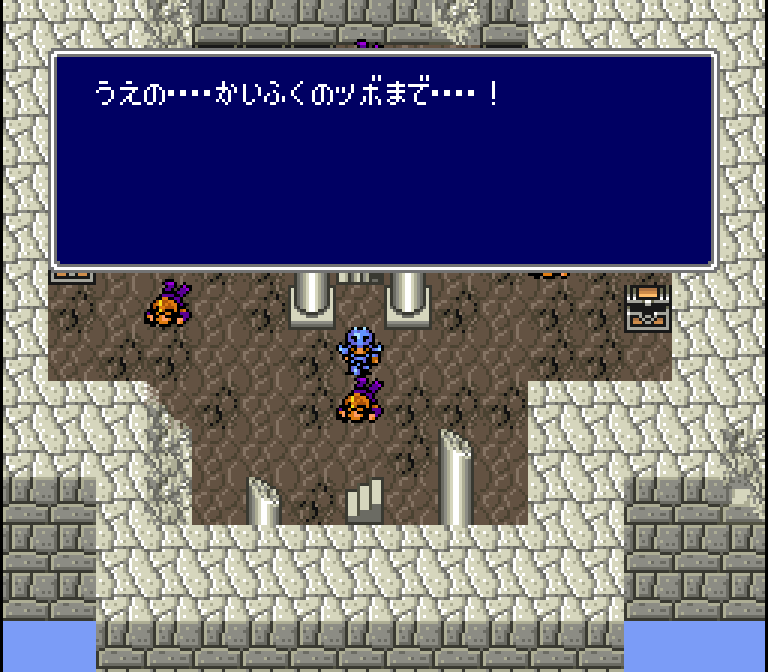 | 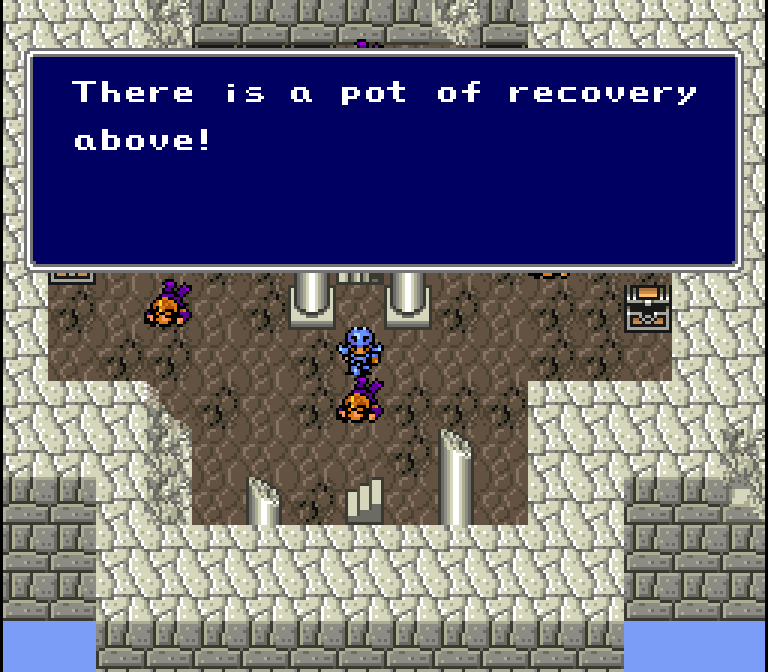 |
| Final Fantasy IV (Super Famicom) | Final Fantasy II (Super NES) |
Inside the castle, one of the soldiers says in English, “There is a pot of recovery above!”
In Japanese, his speech is more labored and isn’t even a complete sentence. If it were a complete sentence, it’d probably be like, “I just… need to reach the pot of recovery… upstairs…!”
So in the Japanese version he’s struggling for his life while he’s more or less just giving you a hint in the English version.
Tellah Finds Anna
 |  |
| Final Fantasy IV (Super Famicom) | Final Fantasy II (Super NES) |
Once you enter the top floor of the castle, a cut scene begins:
| Japanese Version (basic translation) | English Translation |
| Tella: Is that… Oh! Anna! | Tellah: That is Anna! Ah-ah! Anna! |
| Tella: You! You’re that bard! It’s your fault that Anna is…! | Tellah: You’re the bard! You did this to her! |
| Bard: !? | Bard: !? |
First, I always felt that “Ah-ah” was such a weird thing for Tellah to say in the English version.
Second, it should be pointed out that the word Tellah uses for “you” in the Japanese version is a very rude and harsh one. As we’ve seen before, Japanese has many different politeness levels. The use of different politeness levels in different situations can produce different effects.
In this case, Tellah uses the word “kisama”, which is a word for “you” that’s extremely low on the politeness level.
Because English doesn’t quite have the same politeness level structure, translators often have to use different techniques to express the rudeness or vulgarity in cases like this. One such way is to use swears or other such words, so it’s common to see some translators translate “kisama” as “you bastard”, “you asshole”, and other things like that.
In some cases this is perfectly fine with the context – like if a bunch of gang thugs are yelling at a character or something. In other cases, the use of English swears might come off as awkward or unwarranted. It all depends on context.
Japanese doesn’t really have the same sort of “swear word” system that English does. Instead, it uses this politeness system. So how a harsh word gets translated into English comes down 100% to how the translator wants it to. You can give the same harsh sentence to a dozen people and probably get a dozen different translations back.
Anyway, I mention all this in relation to Tellah’s line because:
- The official English translation doesn’t really attempt to convey the harshness of the line
- Fan translations often go the other extreme and use the hard swear words, for example:
My personal opinion is that the official translation’s choice is better than the fan translations and their curse words. It’s all subjective though, so you may disagree. In my experience it’s usually the less-experienced translators who are quick to use swear words.
In all seriousness, though, this line isn’t that huge of a deal in the Japanese text, I only bring it up because back in the late 90s there was a lot of hubbub among American fans about how these sorts of lines had been super-censored in Final Fantasy II. And to this day it’s often mentioned when comparing the games… crap, I’m only perpetuating it.
You Spoony Bard
Probably one of the most-quoted lines in any Final Fantasy game happens here: “You spoony bard!”
It’s so widespread that it doesn’t even really need an introduction. But let’s take a look at how it looks in Japanese and in English.
Basically, Tellah is now angry at the unknown bard and has initiated a battle. During the battle (which you have no control over), the following scene unfolds:
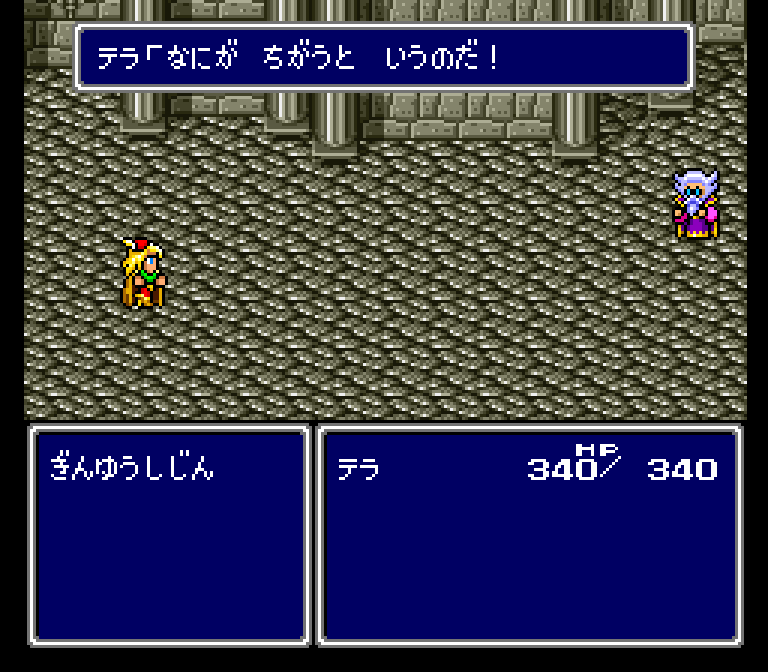 | 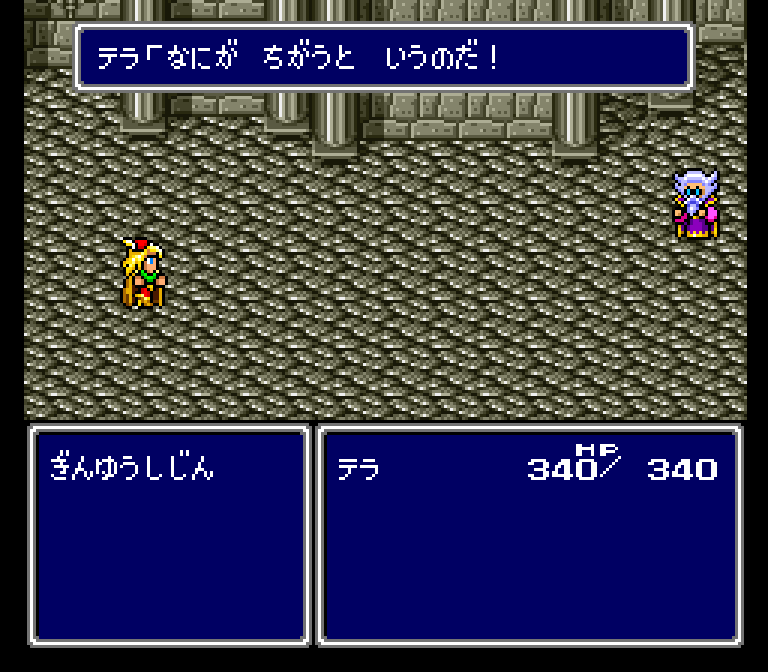 |  |
| Final Fantasy IV (Super Famicom) | Final Fantasy IV Easy Type (Super Famicom) | Final Fantasy II (Super NES) |
| Japanese Version (basic translation) | English Translation |
| Tella: How dare you do this to my daughter… | Tellah: You swindler! |
| Bard: It’s not what you think! | Bard: Please! Listen! |
| Tella: Just how is it not what I think?! | Tellah: You spoony bard! |
| Bard: Please, hear me out! | Bard: Please! |
| Tella: Shut up! | Tellah: Shut up! |
| Bard: Please! | Bard: Listen! |
| Tella: This pain is Anna’s pain… | Tellah: Shut your mouth! |
| Bard: Anna and I are… | Bard: I… I… |
| Anna: Please! Both of you, stop! | Anna: Please! Stop! |
Right away it’s clear that both versions are quite a bit different.
The “How dare you do this to my daughter” part is actually an incomplete sentence, with the verb left off. This is very common in Japanese and is always a tough thing to deal with in translation. I put “do this” here, but it could very easily have been “killed”, which is more likely, given that it’s clear that Tellah thinks Anna is dead in the Japanese version.
I’m not quite sure why Tellah chooses to call the bard a “swindler” in the English version, either. I guess maybe you could see it that way, but it just doesn’t feel like a natural word a native English speaker would’ve used there.
The other differences are pretty obvious and I won’t go into them in detail.
I will mention, though, that nowhere in the Japanese text does he say anything remotely like, “You spoony bard!” So this line – no – most of this entire exchange is the product of the translator or someone on the localization team.
As such, while “You spoony bard!” is a famous line among RPG players outside of Japan, this scene has no such quotability inside Japan. In fact, Japanese sites seem to be puzzled why this English line is considered so memorable and strange to us. Actually, Japanese fans have favorite quotes of their own – we’ll look into those at a later time if I don’t forget.
When I first played Final Fantasy II, I laughed at the spoony bard line because “spoony” is such a weird word. Even as a kid I knew it was most likely a legitimate word, but apparently it was a common misconception that it wasn’t a real English word. I think both reasons are why the phrase became so popular.
For reference, the definition of spoony is, according to Collins English Dictionary (Complete & Unabridged 10th Edition):
Foolishly or sentimentally amorous.
I’d say that describes this bard perfectly!
I think the whole “spoony bard” love affair really took off as the Internet became more prevalent. And even more so when emulators became widespread and as official ports and remakes began to be released.
Actually, an interesting side effect of this line’s infamy is that it’s been kept in every English-language port and remake of FFIV since the game’s original release.
Here it is in the PlayStation 1 port:

And here it is in the Game Boy Advance remake/port:

And here it is in the Nintendo DS remake:

And on the PSP version:
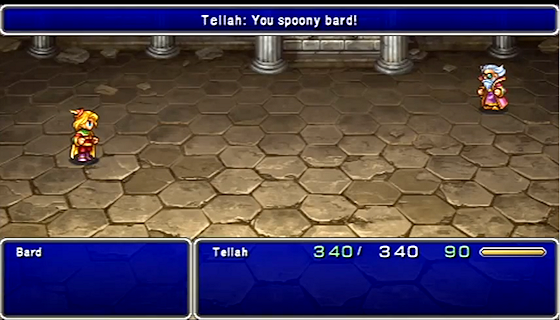
What’s interesting is that in all these remakes and ports, the “spoony bard” line happens at the start of the battle. In the original English script it doesn’t happen until a few lines in. So you can almost see the various translators trying to find a way to insert the line into the text. Or maybe it’s that everyone mistakenly remembers the line’s original timing?
Anyway, the “spoony bard” legacy extends to beyond just remakes and ports of Final Fantasy IV.
Here it is in Final Fantasy X:
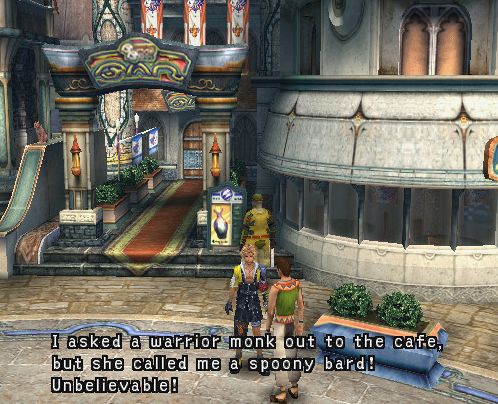
And in Final Fantasy Tactics: The War of the Lions:

And in Dissidia 012, a Final Fantasy crossover game:
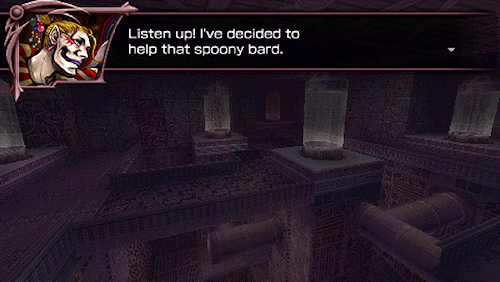
The spoony bard line has even leapt out of the Final Fantasy series entirely! Here it is in a Phoenix Wright game:

And here it is in Trinity Universe:
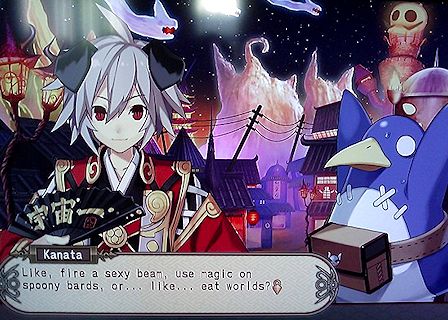
I’m sure I’ve missed some games, so if you have screenshots of “spoony bard” stuff in any other games, send them my way! I think there’s one in Final Fantasy XII and one in Final Fantasy Tactics too…
Story Details
After the spoony bard battle, another scene plays out:
| Japanese Version (basic translation) | English Translation |
| Tella: Anna, you’re alive… | Tellah: Are you all right? |
| Anna: Father… He… Gilbert is the prince of (this kingdom of) Damcyan… To hide his identity… he came to Kaipo as a bard… | Anna: Father, Edward is the Prince of Damcyan. He was disguised as a Bard when he came to see me in Kaipo. |
| I’m sorry, Father… Just running off like that… | Forgive me, Father, for running away. |
| I’m in love with Gilbert… But I wanted to get my beloved father’s consent… | But, I love Edward. We thought of asking for your consent. |
| (But), just as I was about to return to Kaipo… | But when we were about to leave… |
| Gilbert: Baron’s Red Wings, led by a person named Golbeza… | Edward: Golbez attacked us with Baron’s Red Wings. |
| Cecil: Just who is Golbeza? | Cecil: Who is that man? |
| Gilbert: I don’t know… | Edward: I don’t know. |
| He was clad in black, odd armor… His strength almost didn’t seem human… | |
| Cecil: Why would the Red Wings…!? | Cecil: But, why? |
| Gilbert: Once they had the crystal they set fires… | Edward: He took our Crystal of Fire. |
| My mother and father were killed… | |
| And Anna… she shielded me from the arrows… | And Anna shielded me from the arrows. |
| Tella: You loved this man that much… | Tellah: You loved him that much… |
| Anna: Father… Forgive me… I… love… Gilbert! | Anna: Father… forgive me… I… love Edward…! |
| Gilbert: Anna! | Edward: Anna! |
| Tella: Anna! Anna! | Tellah: Anna! Anna! |
Whew! So much to talk about! Let’s look at it in list form:
- Edward is called Gilbert in the Japanese text. More on this in a bit.
- Golbez is called Golbeza in the Japanese text. More on that later as well.
- The description of Golbez is absent in the English text. What’s more, the English text instantly assumes it’s a ‘he’. Obviously this is the case as we see later on, but the Japanese text makes no clear mention of Golbeza’s gender at this point in time. Of course, the mention of weird black armor probably gives it a more masculine feeling anyway.
- The English text suggests it, but the Japanese text makes it very clear that Golbez is now in charge of the Red Wings.
- The English localization specifically calls the crystal here the “Crystal of Fire”, but the Japanese text just says “crystal”.
- The mention of Edward’s parents and their demise is absent in the English text. Thus the Japanese text makes it much clearer that he’s now the successor to take over the kingdom. This information can of course be assumed in the English game, but it’s not made as clear.
- The way that Tellah’s first line is worded in English gives the possible impression that he thought Anna was only wounded and not dead. In fact, when I was a kid, for a long time I thought that was what he thought.
What’s also interesting is a text change in the Japanese versions here:
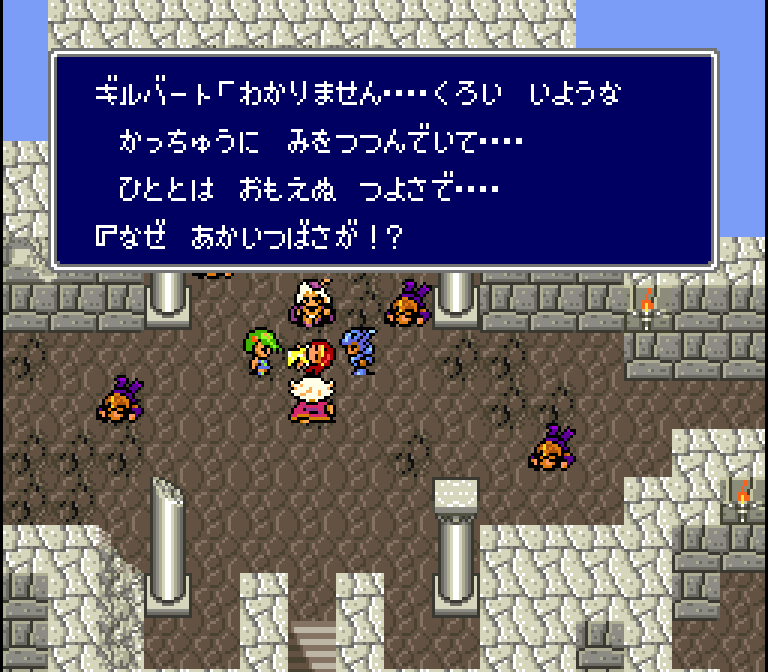 | 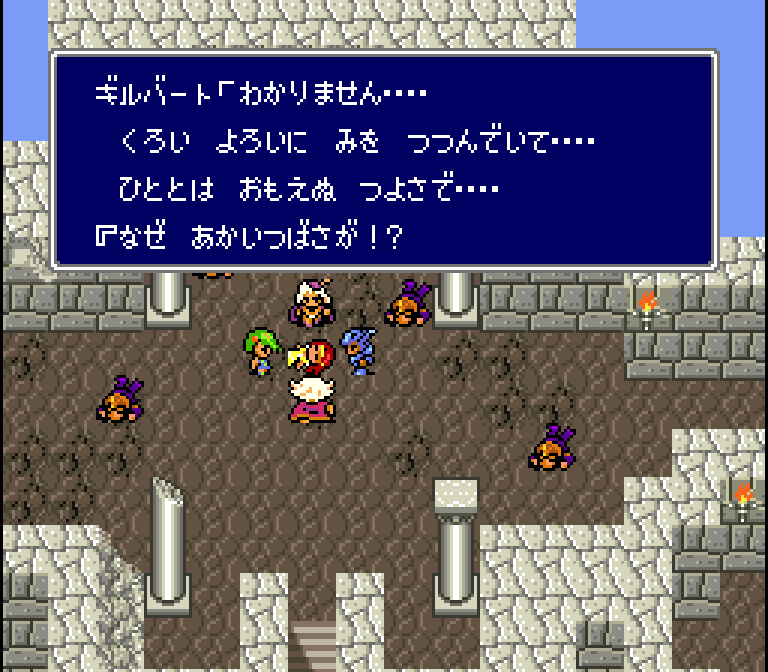 |
| Final Fantasy IV (Super Famicom) | Final Fantasy IV Easy Type (Super Famicom) |
| Final Fantasy IV (basic translation) | Final Fantasy IV Easy Type (basic translation) |
| Gilbert: I don’t know… He was clad in black, odd armor… His strength almost didn’t seem human… | Gilbert: I don’t know… He was clad in black armor… His strength almost didn’t seem human… |
What’s more, a simpler word for “suit of armor” is used in FFIV Easy Type.
There’s also this line that happens after Anna dies:
| Final Fantasy IV (basic translation) | Final Fantasy IV Easy Type (basic translation) |
| Gilbert: I’ve only heard that he recently arrived in Baron and that he’s been leading the Red Wings to collect the crystals… | Gilbert: I’ve only heard that he recently arrived in Baron and that he’s been using the Red Wings to collect the crystals… |
Edward’s Name
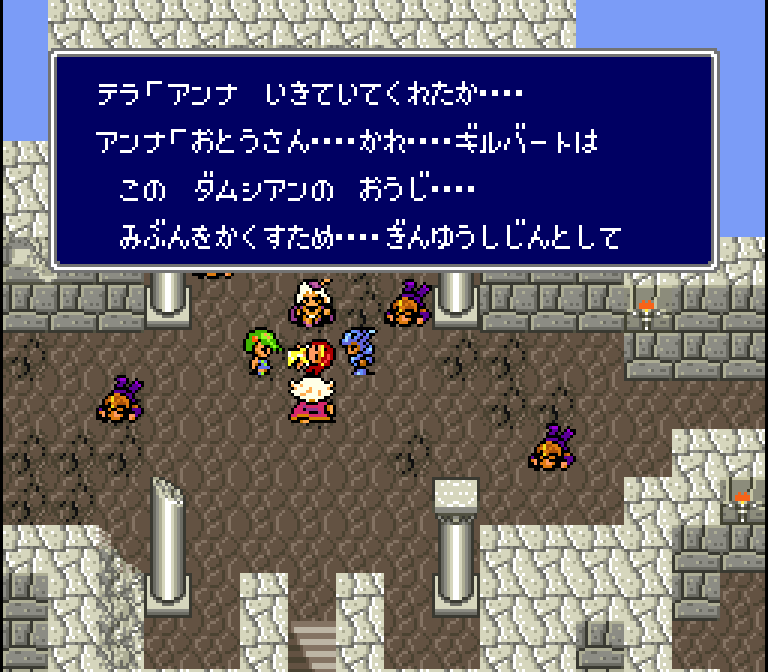 | 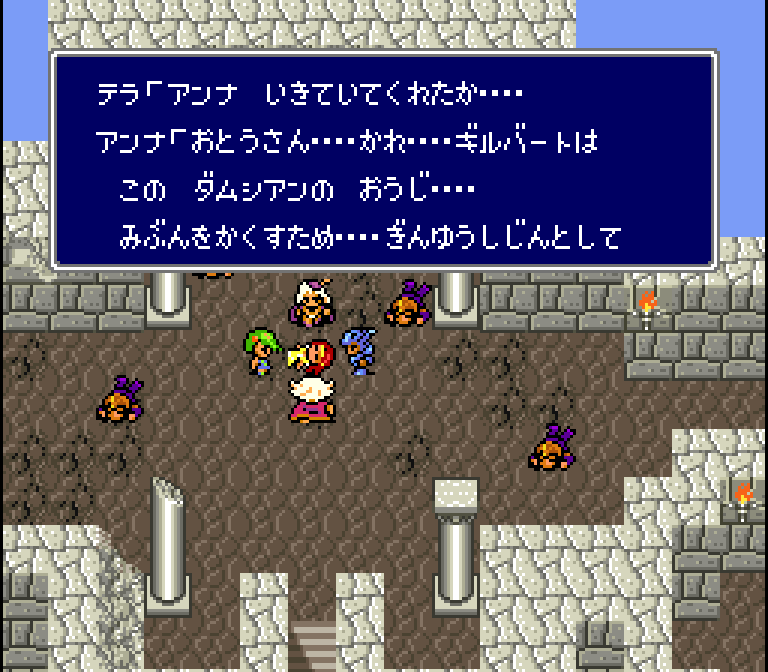 | 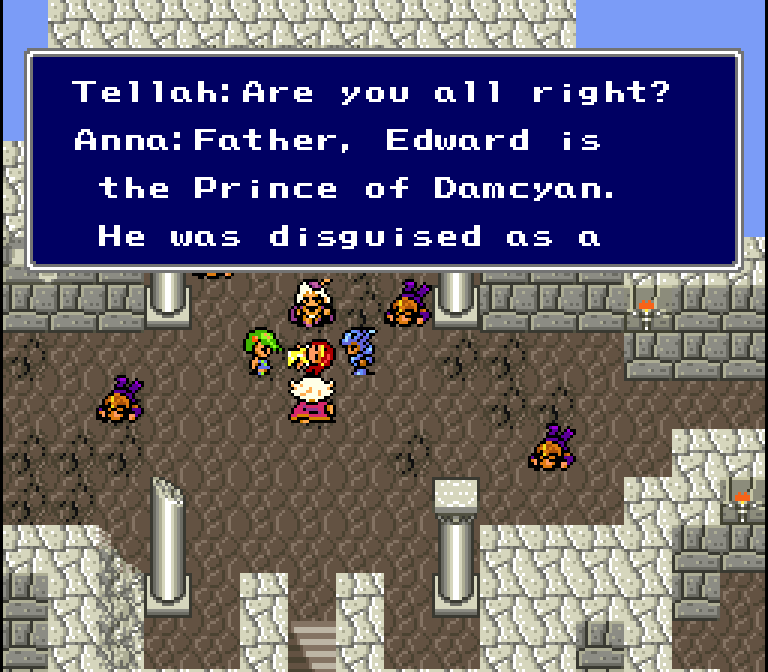 |
| Final Fantasy IV (basic translation) | Final Fantasy IV Easy Type (basic translation) | Final Fantasy II (Super NES) |
As noted before, the Japanese games call the bard “Gilbert” while the English localization calls him “Edward”.
I honestly have no idea why this was changed. I was reminded of why Ted Woolsey changed “Tina” to “Terra” in Final Fantasy III for the Super NES – his reasoning was that “Tina” was a real name outside of Japan and didn’t have that sort of otherworldy foreignness to it.
But I’m guessing that wasn’t the reason for this name change. After all, “Edward” is probably more common than “Gilbert”. Not to mention “Cecil” is a real name, as is “Rosa”.
 |  |  |
| Final Fantasy IV (basic translation) | Final Fantasy IV Easy Type (basic translation) | Final Fantasy II (Super NES) |
Now, the question is: “Is ‘Gilbert’ how it should really be spelled?”
Checking the Japanese manual, we see that it’s indeed spelled “Gilbert”:
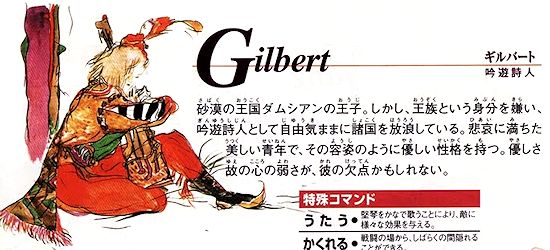 |
Given the manual’s track record thus far, it seems “Gilbert” is the correct spelling and that all is well.
But wait! Travel nearly two decades into the future when the sequel/spinoff/whatever is released and you’ll encounter this:
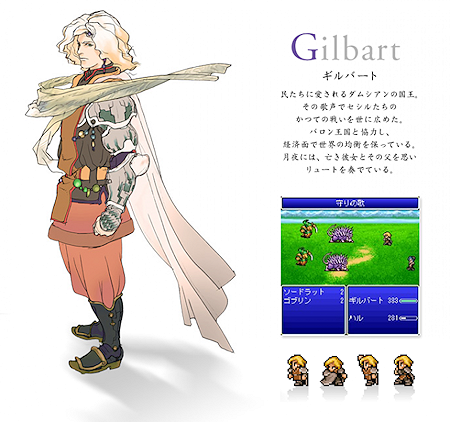 |
Gilbart? What?
As I’ve mentioned before, you really have to take “official” English spellings with a grain of salt. I can’t even count the number of times I’ve encountered incorrect English by a Japanese creator or licensor. Maybe I’ll talk in more detail about that another day.
In any case, I’m pretty much 100% sure that this “Gilbart” is just another instance of the Japanese creators/development team getting English wrong. It’s an easy and understandable mistake to make based on the katakana, plus I’m told a similar thing called Cecil a “Paradin”. I don’t have a picture of that handy, though – please send me one if you do!
Pre-Release Translation
 |  |
| Pre-release version | Final release |
The Final Fantasy II manual shows Tellah saying at one point, “I don’t need any help! This is my own business!”
The final version is different though: “I don’t need any help! This is my own affair!”
Both are okay translations, but I guess an editor felt “affair” sounded clearer and more natural here.
Determined Words
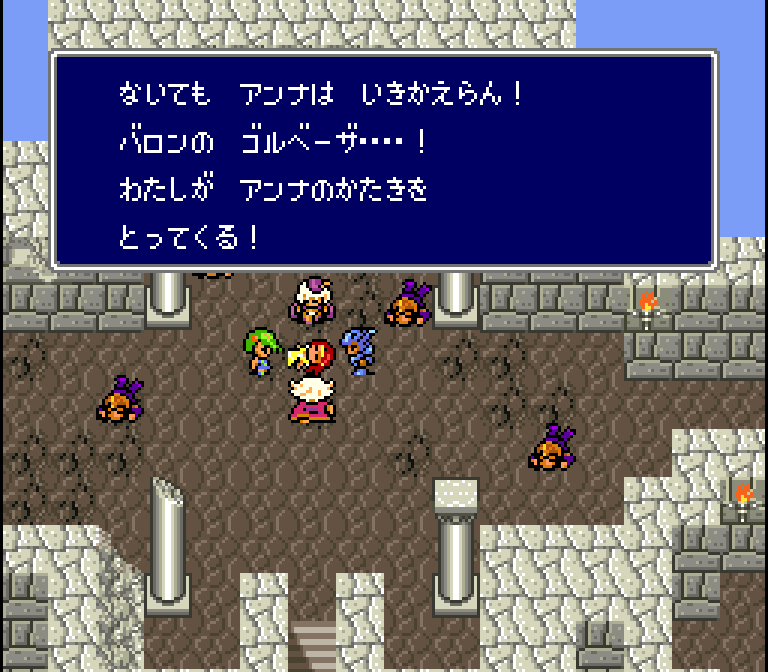 | 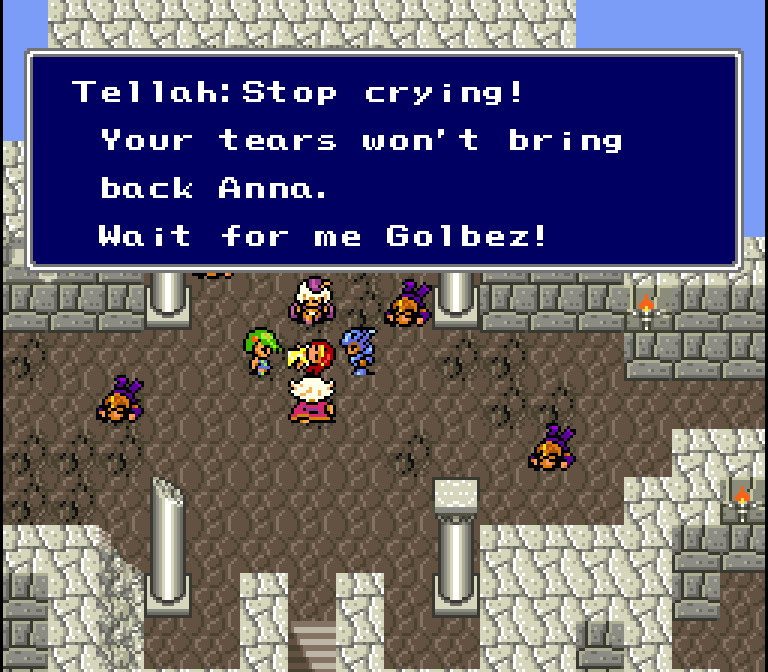 |
| Final Fantasy IV (Super Famicom) | Final Fantasy II (Super NES) |
As Tellah is just about to vow revenge, in English he says, “Wait for me Golbez!”
In Japanese, he instead says, “Golbeza of Baron…!”
This isn’t a big deal at all. But I’m intrigued by it because this “Wait for me, (insert name)!” thing is a very common phrase for this sort of thing in Japanese. It obviously works in English, but it’s just so, so common in Japanese during these sorts of scenes that it really makes me think this line and probably this entire part was originally translated by a native Japanese speaker.
I guess it’s kind of like a translator fingerprint, you could say. There are often other little things that act as similar fingerprints, maybe that’ll be a good topic for another day.
I could be wrong, of course, but I thought it was an interesting thing to mention.
Edward’s Knowledge
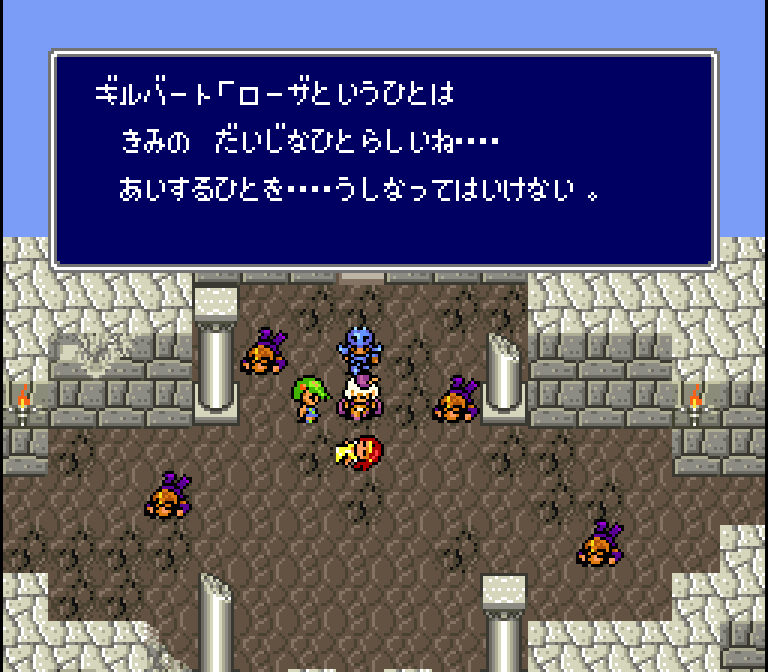 |  |
| Final Fantasy IV (Super Famicom) | Final Fantasy II (Super NES) |
After Edward does his sobbing, Cecil gives him a good talking to. Here’s how part of this scene goes:
| Japanese Version (basic translation) | English Translation |
| Cecil: I’m Cecil. I absolutely need the Light of the Desert in order to save my friend who’s fallen ill with a high fever in Kaipo. And for that… I need your help! | Cecil: I am Cecil. I’m looking for the SandRuby to help my friend who is ill in Kaipo. And I need your help! |
| Gilbert: Me… help…? | Edward: I…? Help you…? |
| Cecil: Yes. For Rosa’s sake… Please! | Cecil: Yes. You. |
| Gilbert: This Rosa person sounds like a dear person to you… | Edward: She seems to be an important person. |
First, if you’re just joining in, the SandRuby is called the “Light of the Desert” in the Japanese versions.
Second, Cecil says “And for that I need your help” in Japanese because only the royal family is able to enter the Antlion cave. The English text just says, “I need your help”, which lacks the slight nuance that only Edward can provide the help he needs.
Lastly, the most interesting thing is that Edward somehow instantly knows, without a name or any other information, that Cecil’s ill friend in Kaipo is female.
It might have made sense if Cecil had stated that the friend’s name was Rosa in English – it is a feminine-sounding name and all. But he doesn’t in the translation. So Edward is either psychic, knows everyone in the world already, said this due to slightly careless script trimming, or is part of some sort of conspiracy.
Edward Joins
Once Edward/Gilbert joins you, it says so in the text box. What it says is different in both language versions:
 | 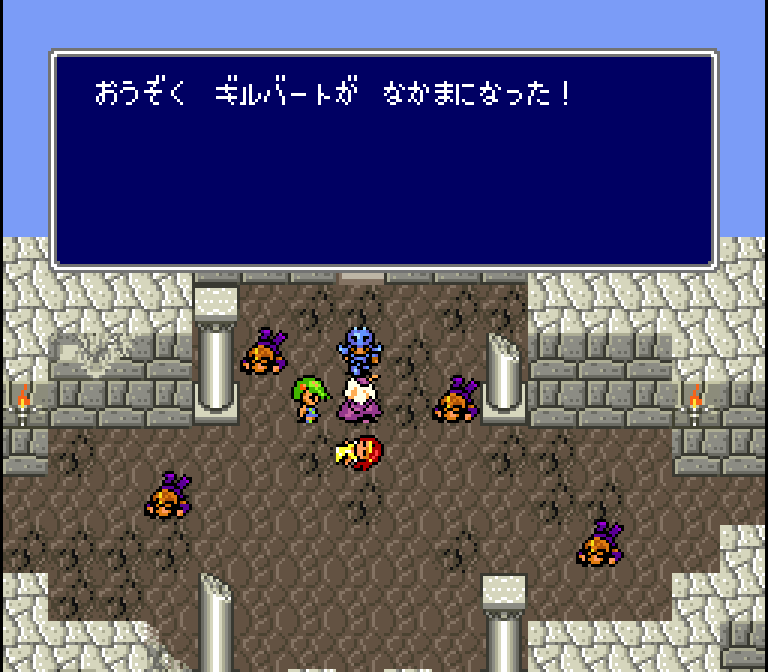 | 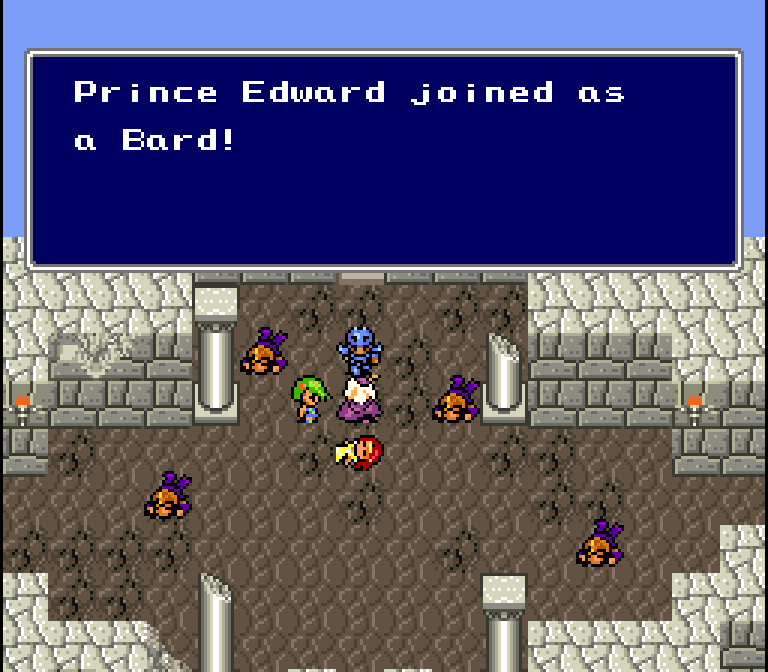 |
| Final Fantasy IV (Super Famicom) | Final Fantasy IV Easy Type (Super Famicom) | Final Fantasy II (Super NES) |
In Japanese, it says, “Gilbert, the royal, has joined!”
In English, it says, “Prince Edward joined as a Bard!”
If you recall, the whole “bard” thing was originally just a disguise. But the English localization keeps the charade going.
Incidentally, “royal” is usually used as more of an adjective than as a noun, but it’s indeed a legitimate noun.
Edward in Detail
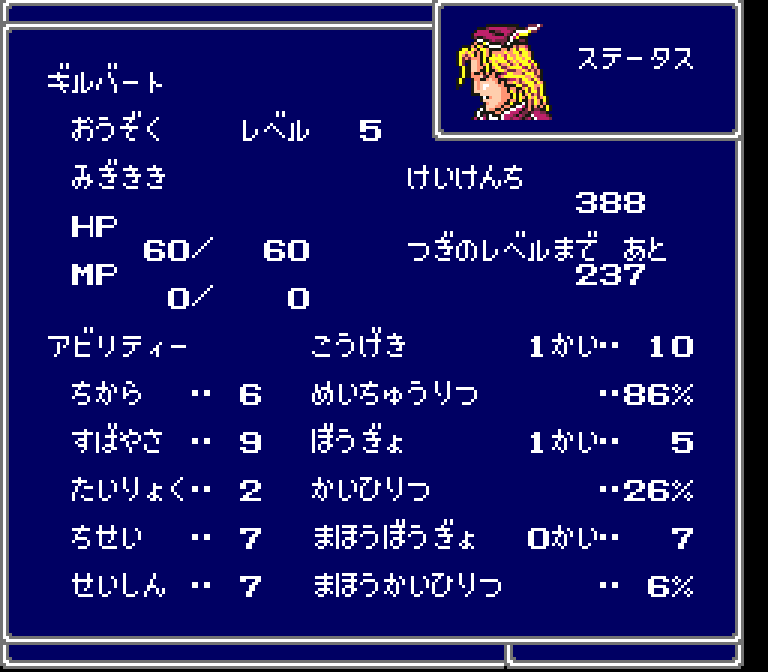 | 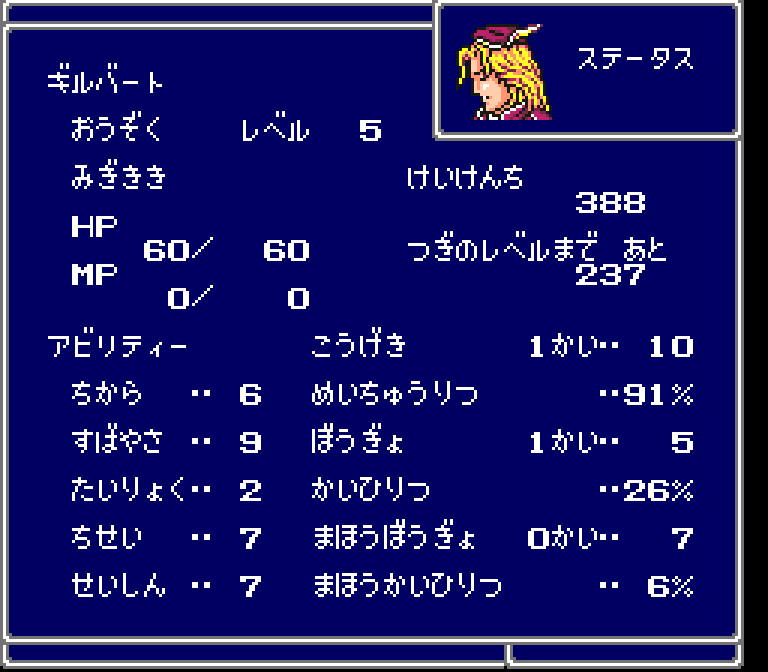 | 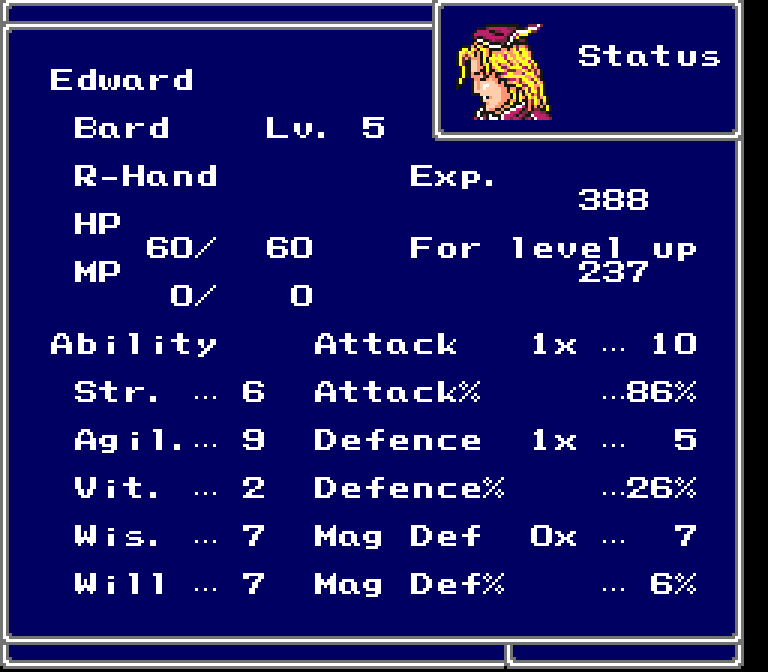 |
| Final Fantasy IV (Super Famicom) | Final Fantasy IV Easy Type (Super Famicom) | Final Fantasy II (Super NES) |
Once Edward/Gilbert has joined, checking his stats reveals a slight change:
- In Final Fantasy IV, he has a hit accuracy of 86%.
- In Final Fantasy IV Easy Type, this was upped to 91%.
- In Final Fantasy II, the accuracy is back down to 86%.
This is with his default weapon equipped. After taking his weapon off, his accuracy is equal in all three versions.
So it looks like his weapon stats were changed for Final Fantasy IV Easy Type but not for Final Fantasy II. Yet another case of Final Fantasy II being different from Easy Type.
Another point of interest is that his description says he’s a “Royal” in Japanese but a “Bard” in English. It looks like the English localization is really running with this “let’s keep him as a bard” thing.
Edward’s Battle Commands
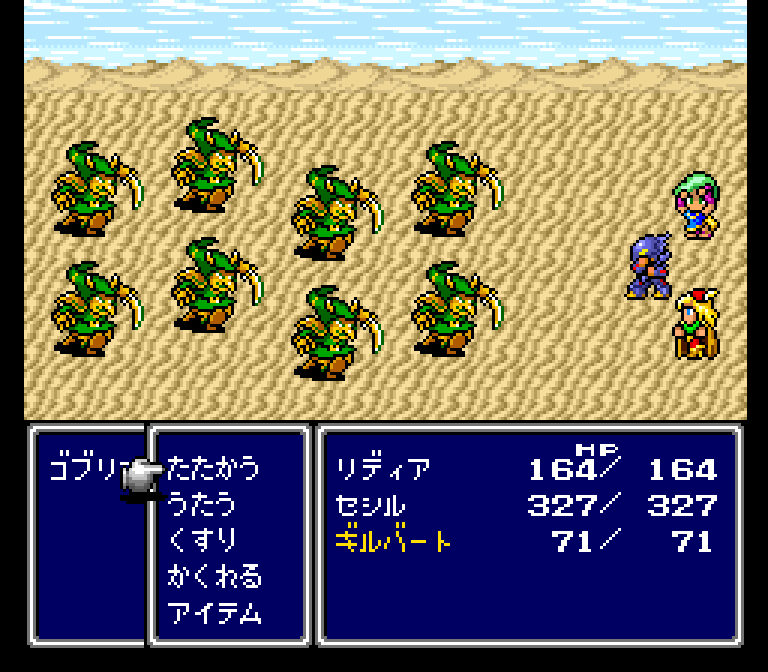 | 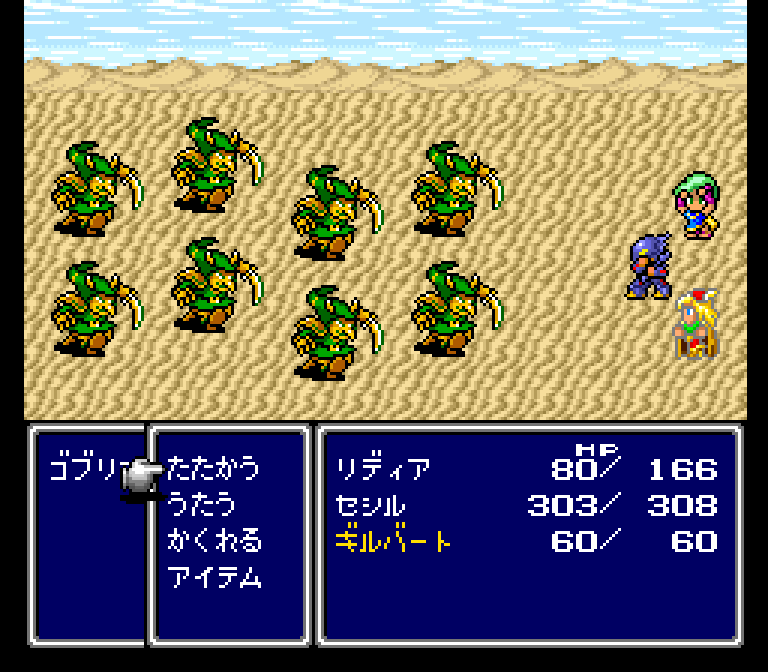 | 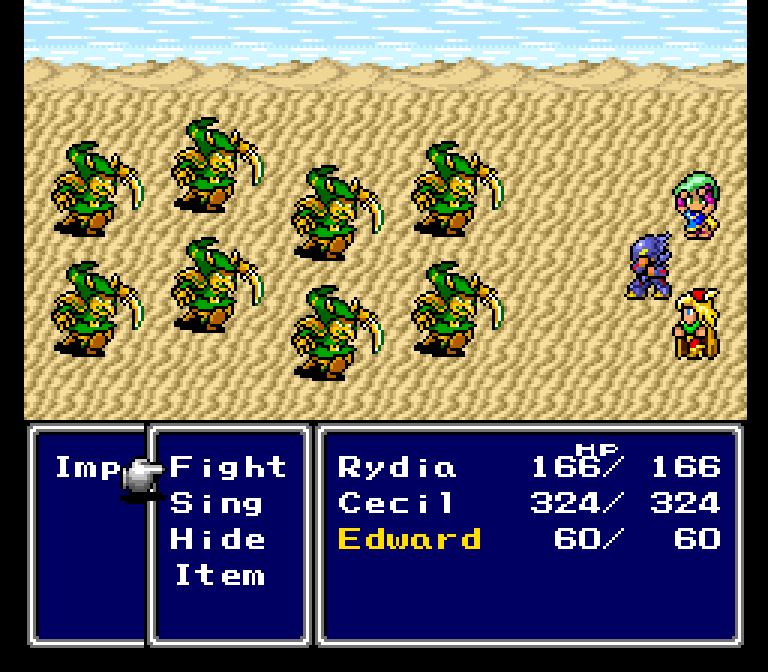 |
| Final Fantasy IV (Super Famicom) | Final Fantasy IV Easy Type (Super Famicom) | Final Fantasy II (Super NES) |
Just like all the other characters, Edward/Gilbert has unique battle abilities. In the original Final Fantasy IV, he has:
- Sing
- Medicine
- Hide
In Final Fantasy IV Easy Type, he only has “Sing” and “Hide”. The “Medicine” command was removed.
The English-language Final Fantasy II for the Super NES also only has “Sing” and “Hide”.
When used, the “Medicine” command heals the entire party a small amount by using a potion from your inventory. You’d think it would actually make the game easier, but it restores such a trivial amount of HP that it’s nearly useless. I’m guessing it was removed because of its pointlessness and to help streamline the battle system… but if so, why leave his other commands untouched? Very strange.
Under the Castle
There’s a secret area in Damcyan Castle. In it, you’ll find lots of treasures and a dying guy:
 | 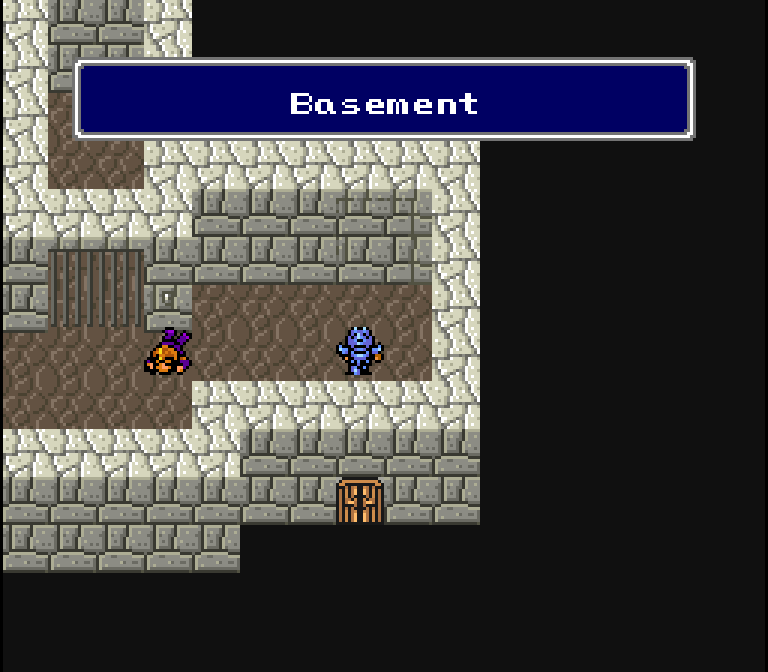 |
| Final Fantasy IV (Super Famicom) | Final Fantasy II (Super NES) |
In Japanese, this place is called “Damcyan Prison”.
In English, it’s changed to simply say “Basement”.
Item & Treasure Changes
As seen before, the contents of treasure chests sometimes differ in each of the versions of the game. Here’s a look at the ones that have been changed:
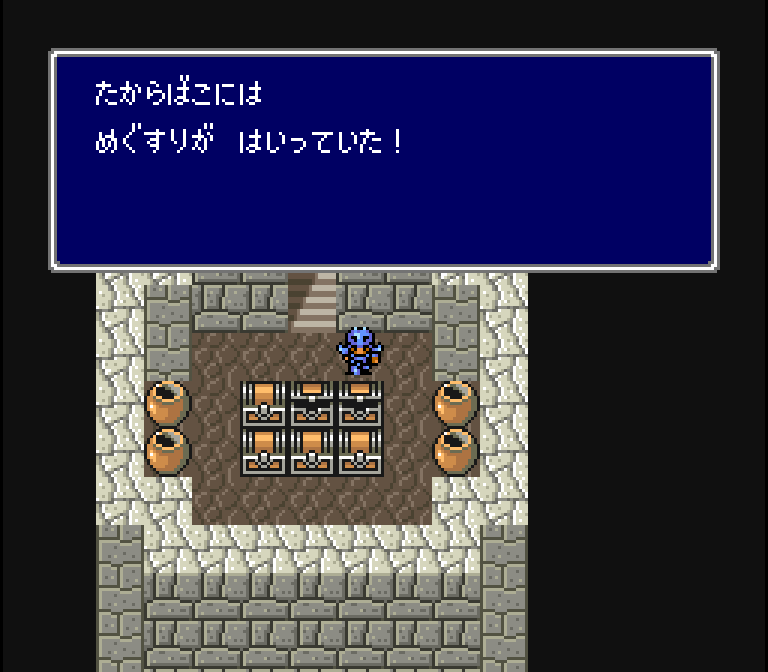 | 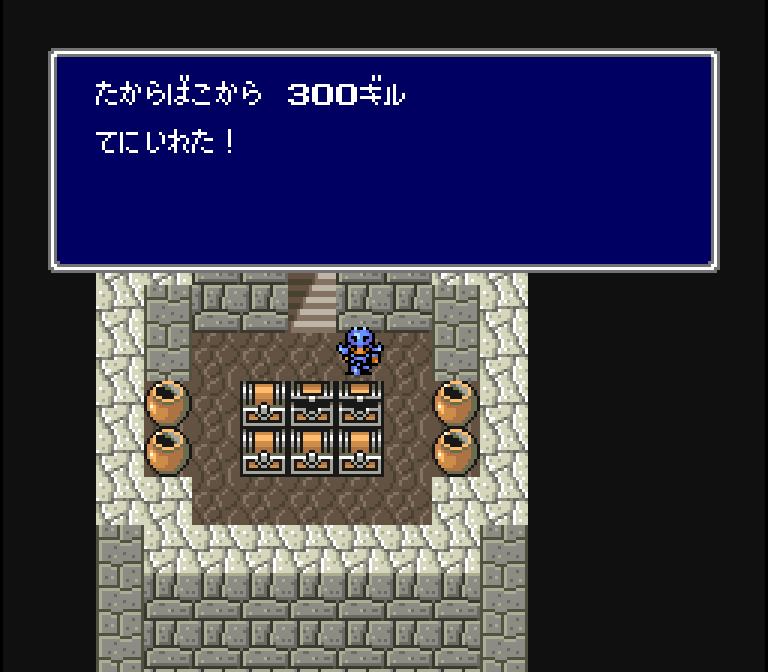 | 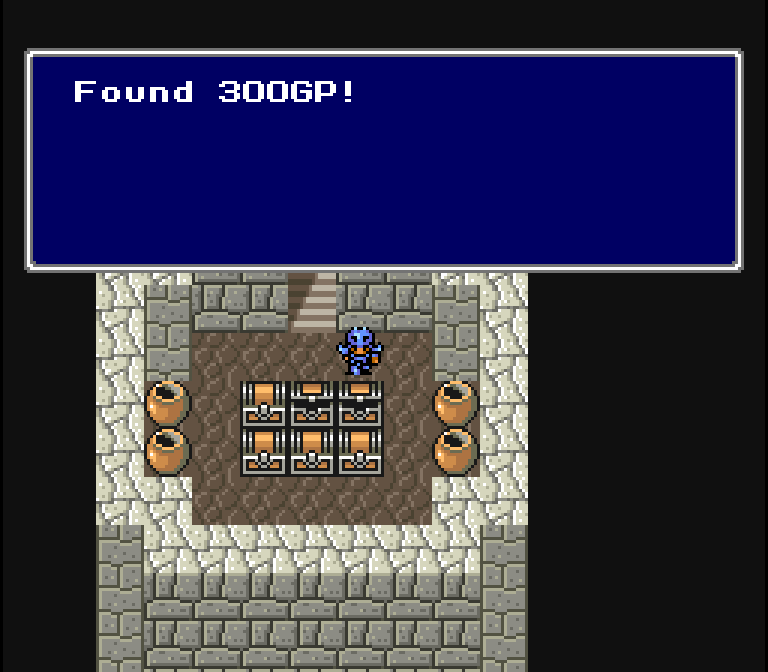 |
| Final Fantasy IV (Super Famicom) | Final Fantasy IV Easy Type (Super Famicom) | Final Fantasy II (Super NES) |
| Location: | Final Fantasy IV | Final Fantasy IV Easy Type | Final Fantasy II |
| B1F | Antidote | Potion | Cure1 |
| B1F | Eyedrops | 300 Gil | 300 GP |
| B1F | Gold Needle | 200 Gil | 200 GP |
What’s more, we see that what are called “Holy Arrows” in the Japanese versions are called “White Arrows” in the English localization. Well, just “White” with the arrow icon next to it, technically:
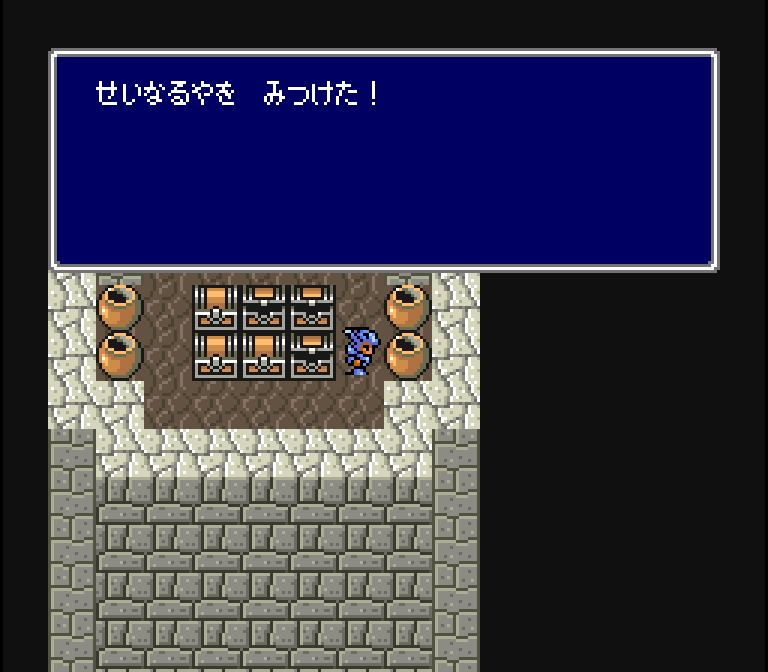 | 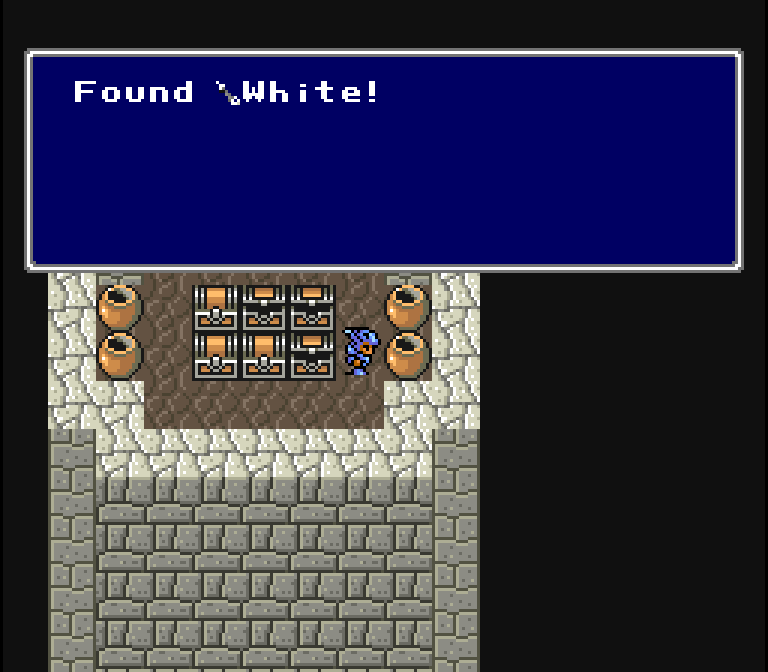 |
| Final Fantasy IV (Super Famicom) | Final Fantasy II (Super NES) |
This change from “holy” to “white” happens elsewhere in the game and even sort of continued on in Final Fantasy III’s localization too, in a way. Nintendo was wary of any sort of religious stuff at this point in time, so a lot of it had to be changed. Even arrows.
Old Survivor Man
If you check the top floor of the tower, there are two old people who survived the bombing:
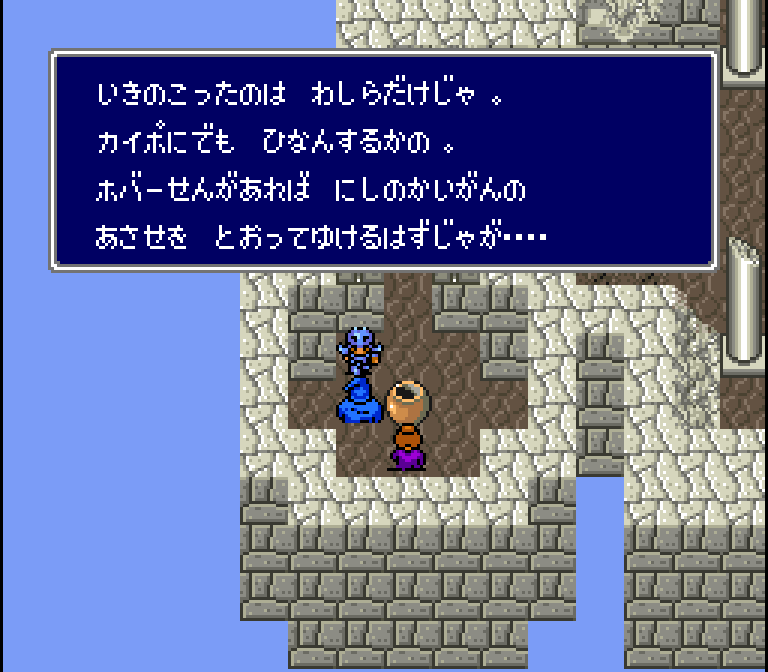 | 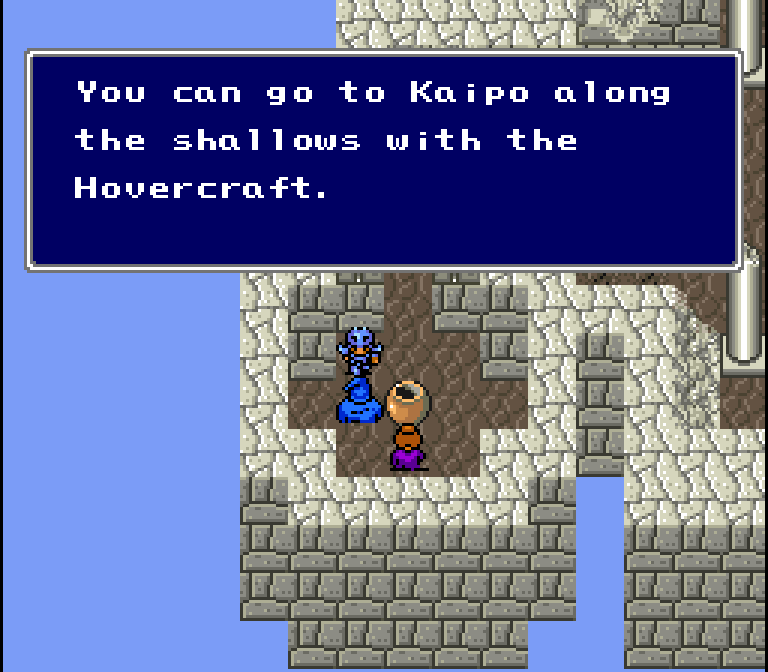 |
| Final Fantasy IV (Super Famicom) | Final Fantasy II (Super NES) |
In Japanese, the old man says in a decidedly old man way, “We’re the only ones who survived. I suppose we’ll evacuate to Kaipo or somewhere. With a hovercraft we should be able to cross the shallows on the western shore, but…”
In English, this gets changed to, “You can go to Kaipo along the shallows with the Hovercraft.”
So the English version dropped the fact that they were the only survivors, that they’re seeking a place to go, and that they want to take a hovercraft to get away.
“Hovercraft” is capitalized in the English version for some reason.
Old Survivor Woman
Similar to the above old man, this old lady had her text simplified too:
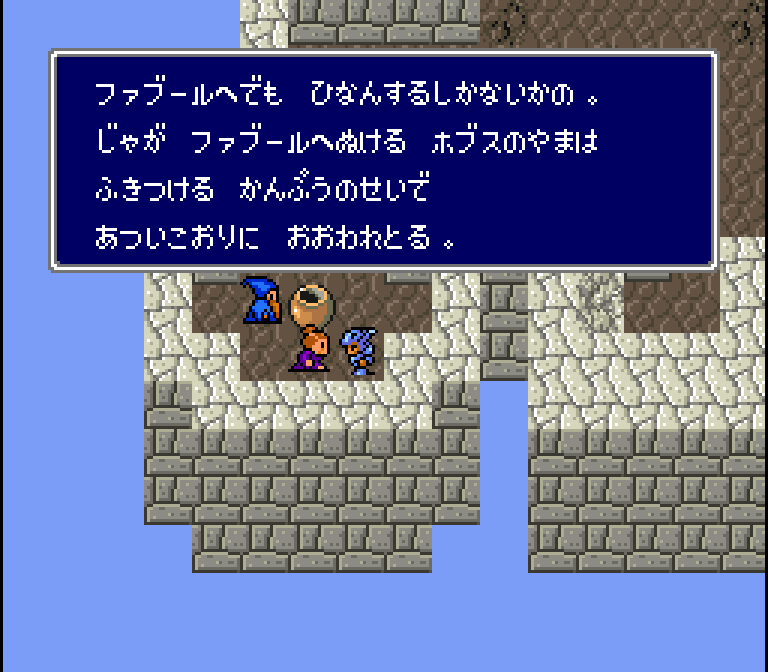 | 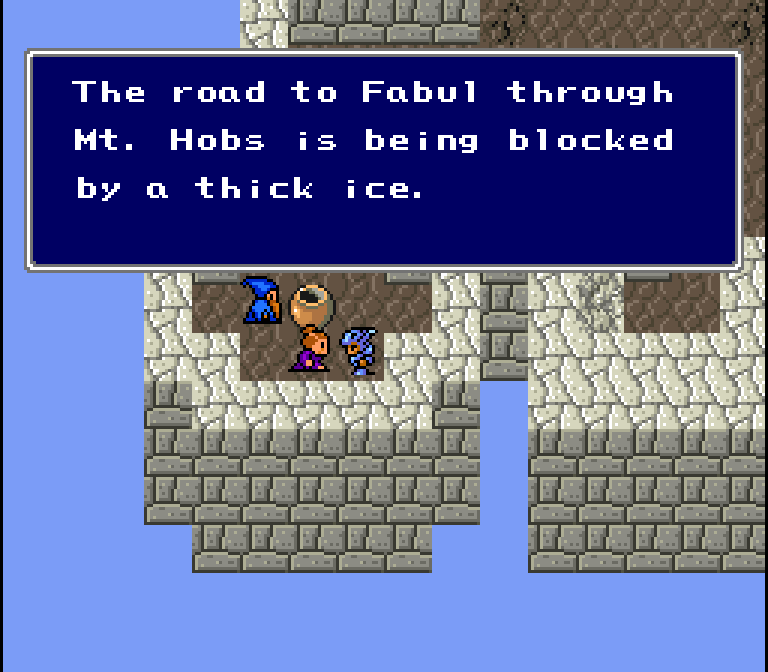 |
| Final Fantasy IV (Super Famicom) | Final Fantasy II (Super NES) |
In Japanese, she says, “I guess our only choice is to evacuate to Fabul or somewhere. But Mt. Hobs, which leads to Fabul, is covered in thick ice due to the cold winds that blow there.”
In English, this is shortened to say, “The road to Fabul through Mt. Hobs is being blocked by a thick ice.”
Again, the fact that they’re seeking a new place to be has been dropped in the English version. It almost makes you think they’re crazy people for staying in a destroyed castle full of dead people.
Revisiting the Waterfall
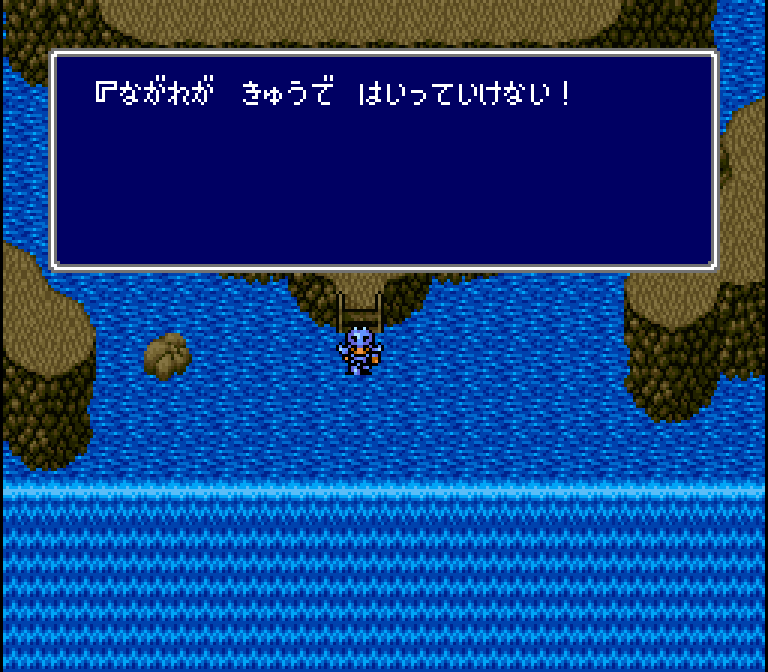 |  |
| Final Fantasy IV (Super Famicom) | Final Fantasy II (Super NES) |
If you take the hovercraft back to Kaipo and then go back into the cave where you got Tellah, you can try to jump into the waterfalls again. I don’t remember ever trying it before, so I thought this would be a good time to see what happens.
It turns out the game says the current is too fast for you to enter. Which is good, because you’d get stuck in the game and be unable to go anywhere but Damcyan if the game let you through here now.
The Japanese and English text are essentially the same for this line.


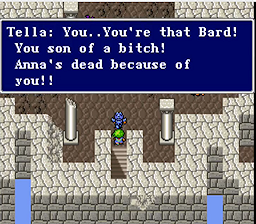
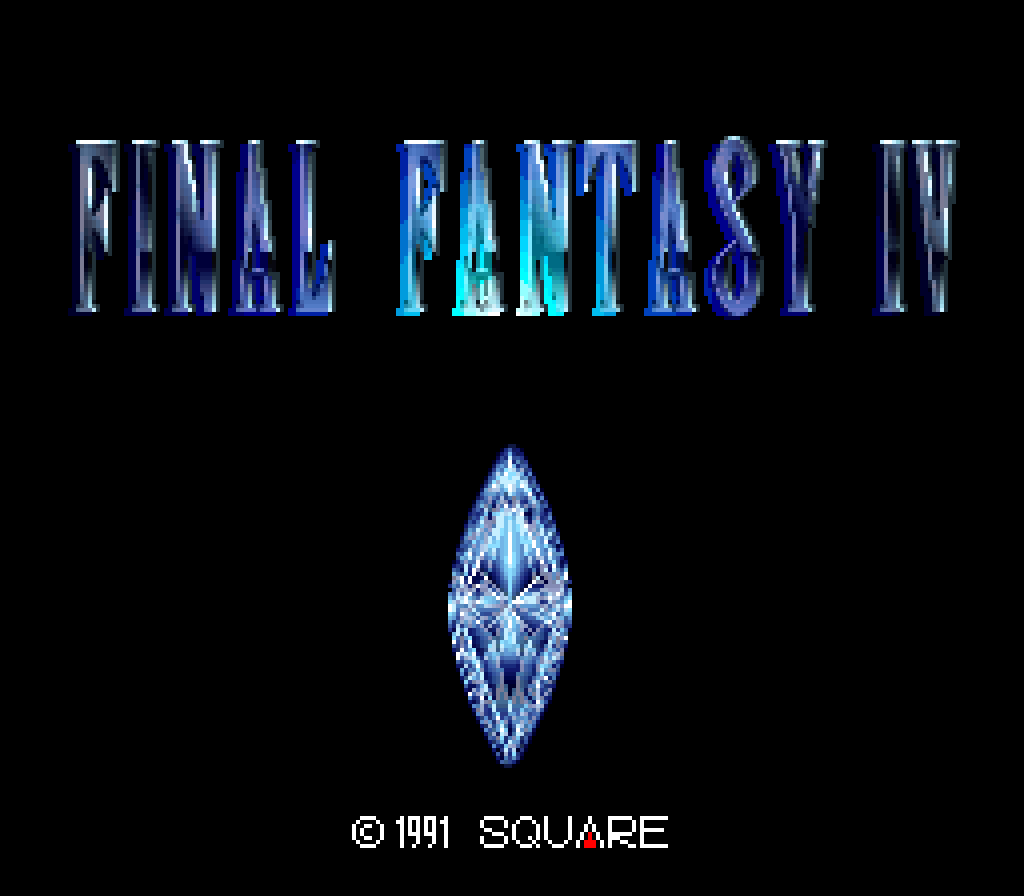
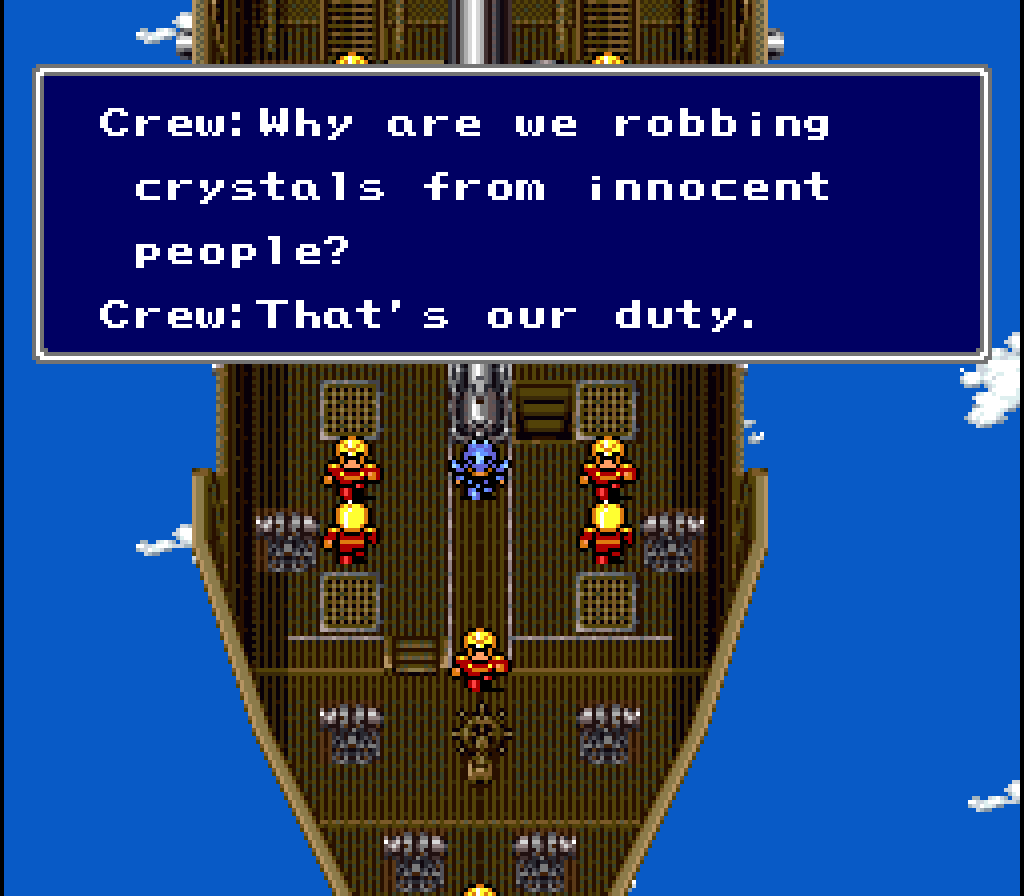
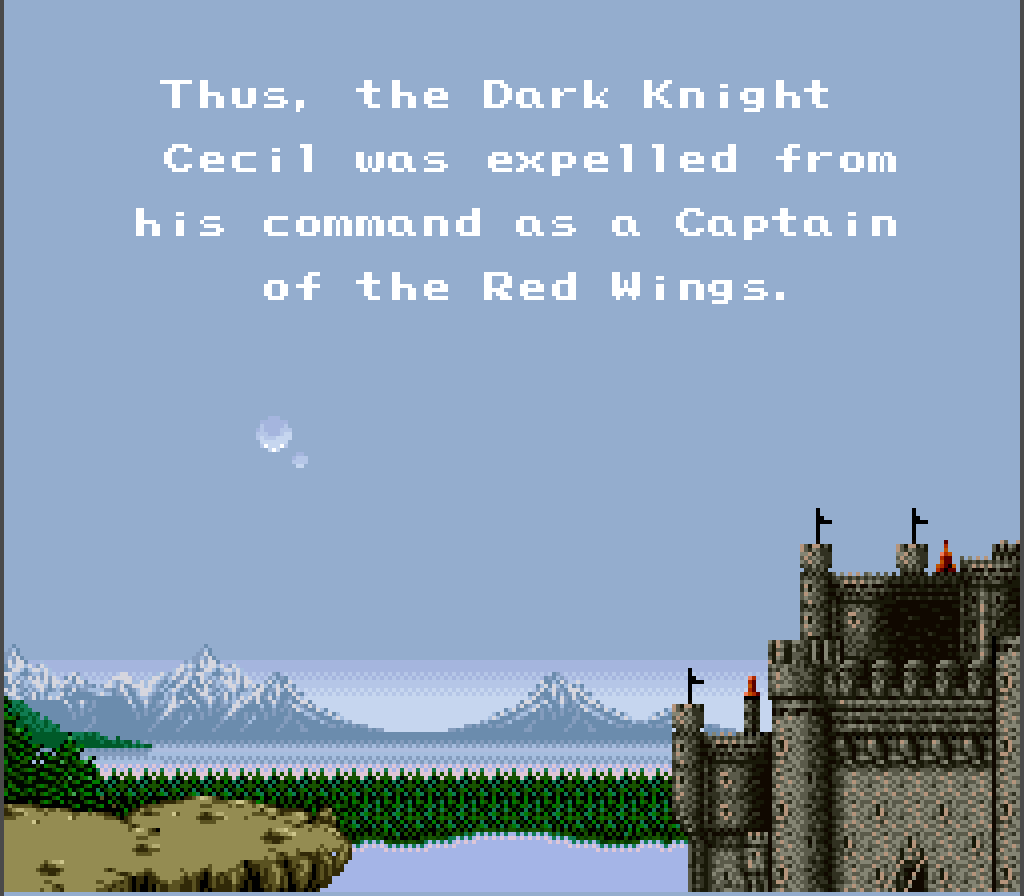
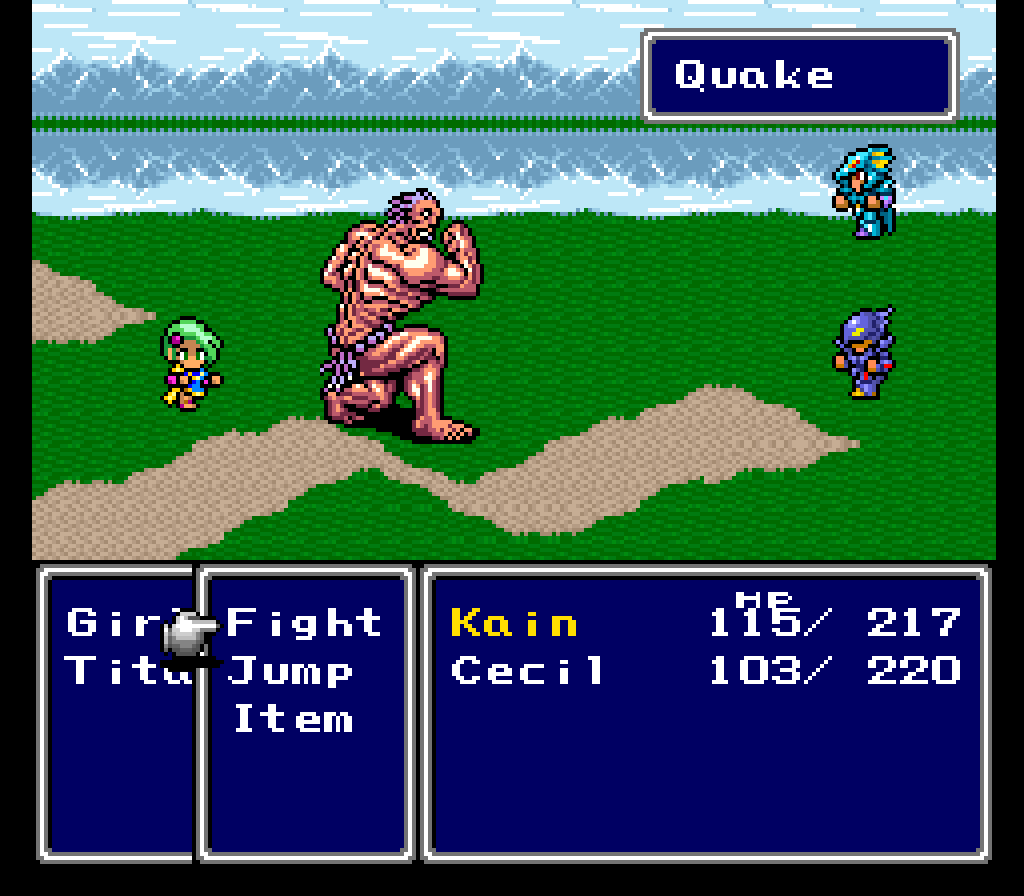
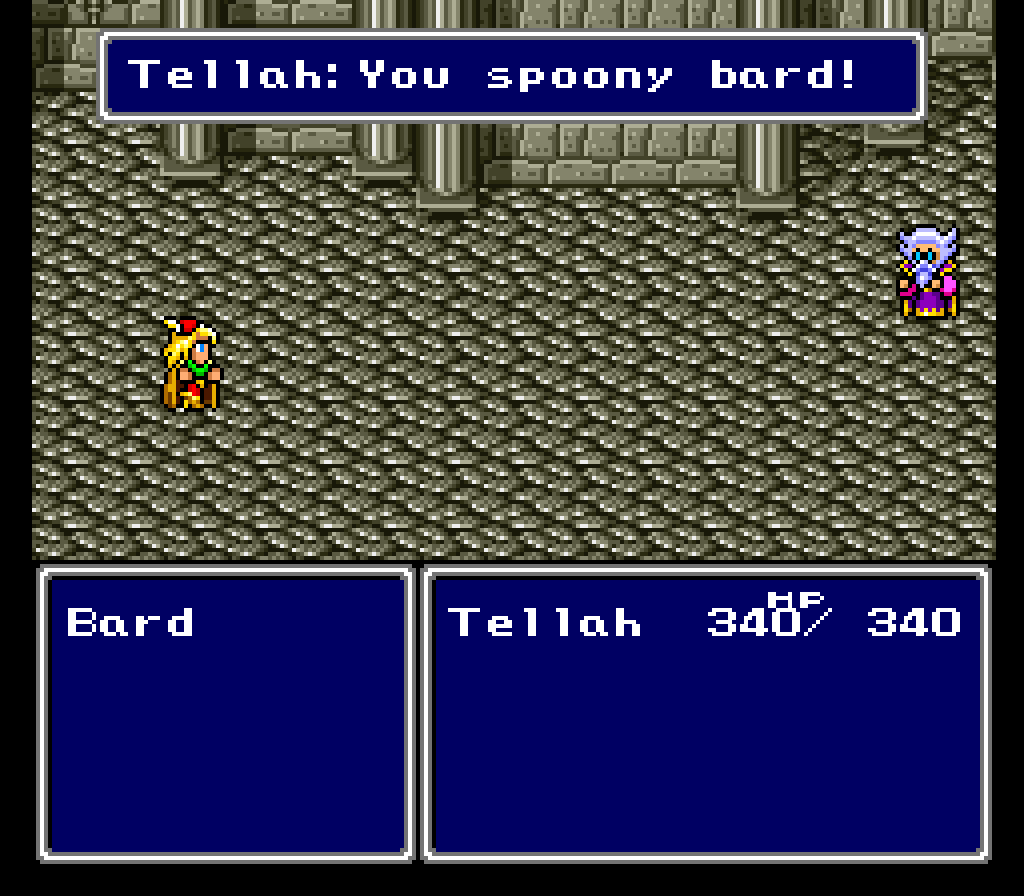
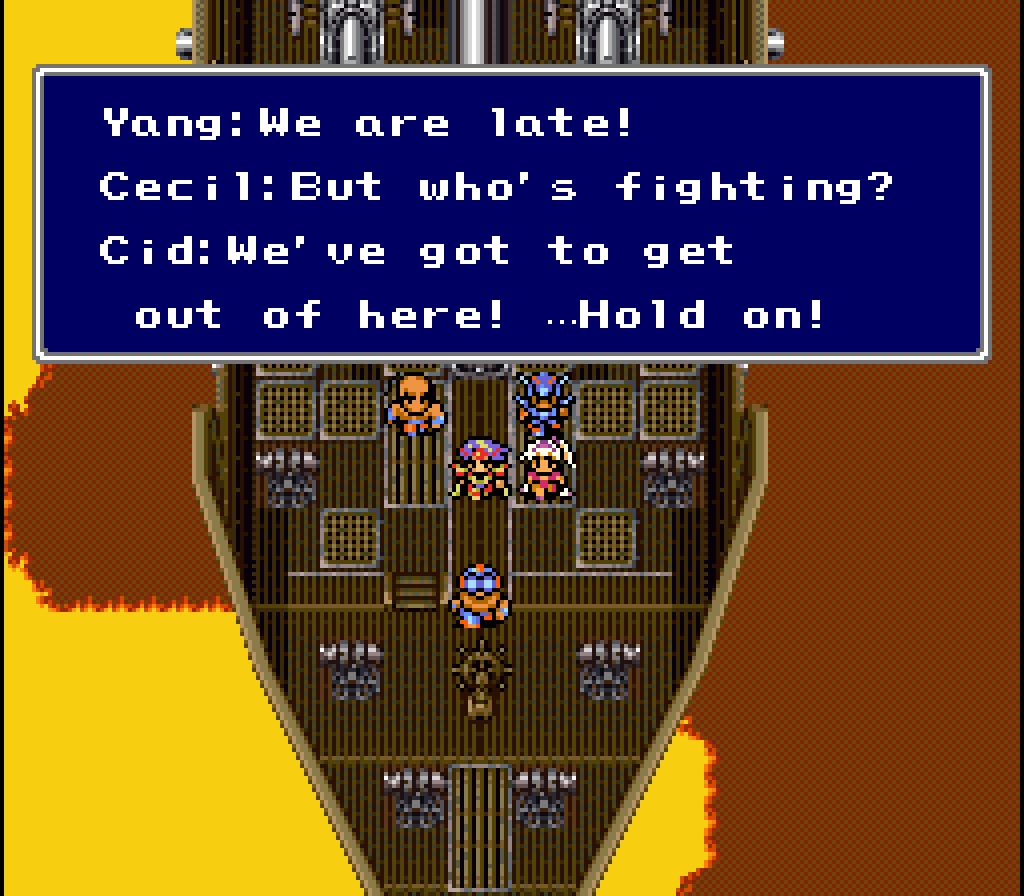
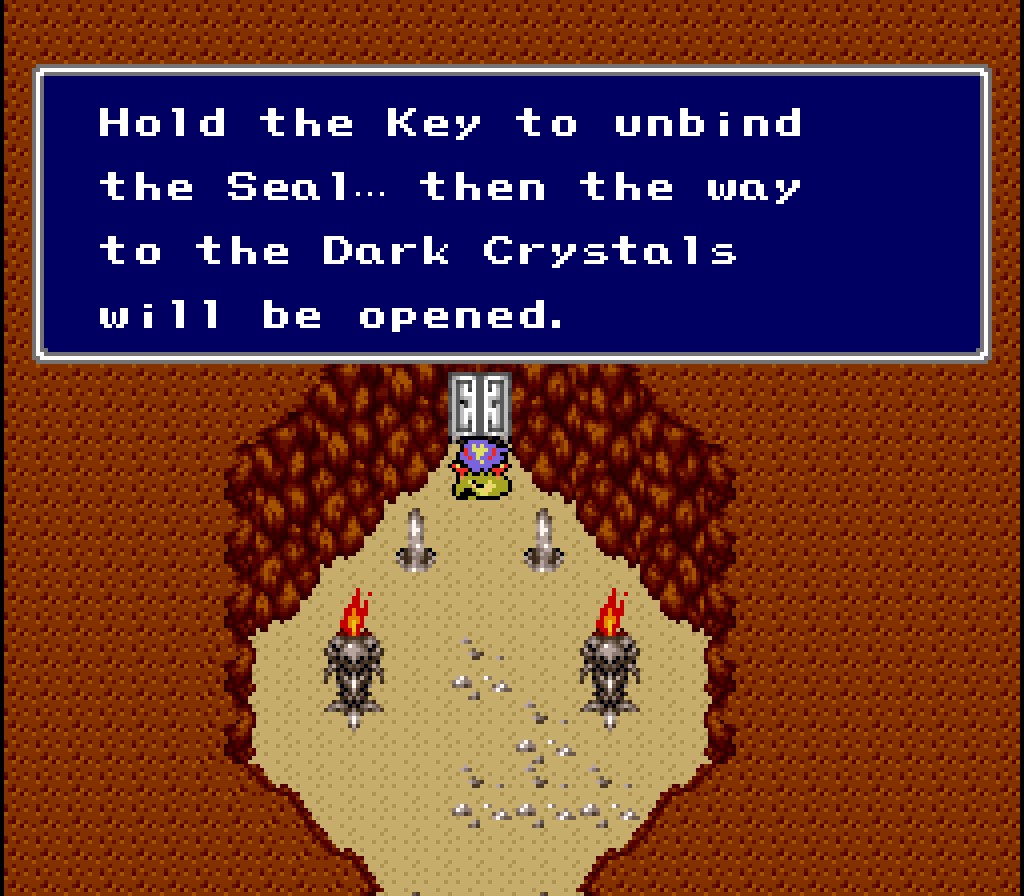
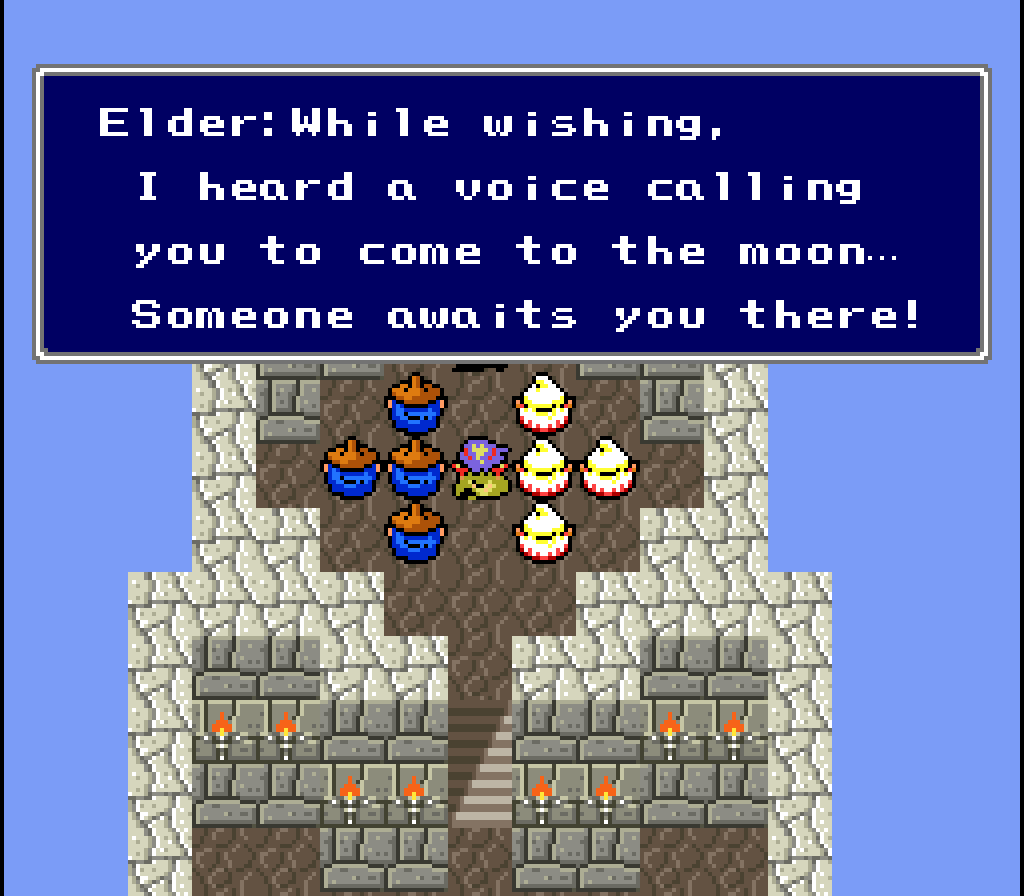
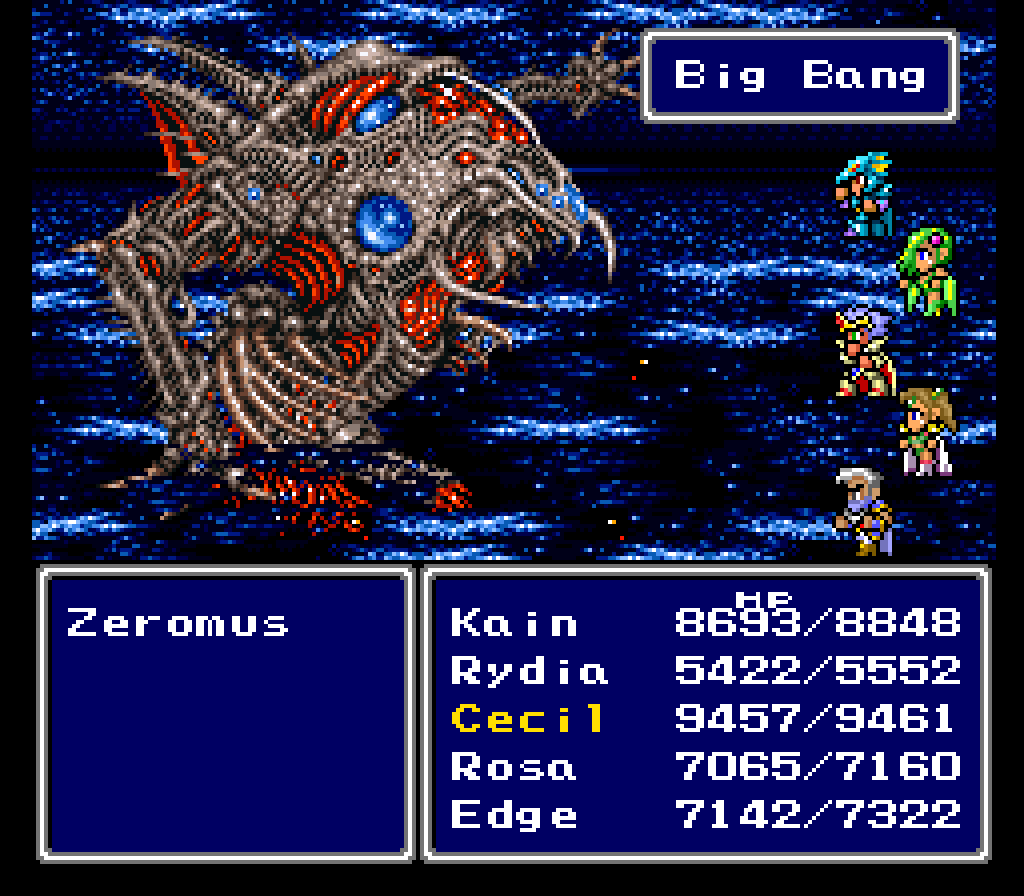
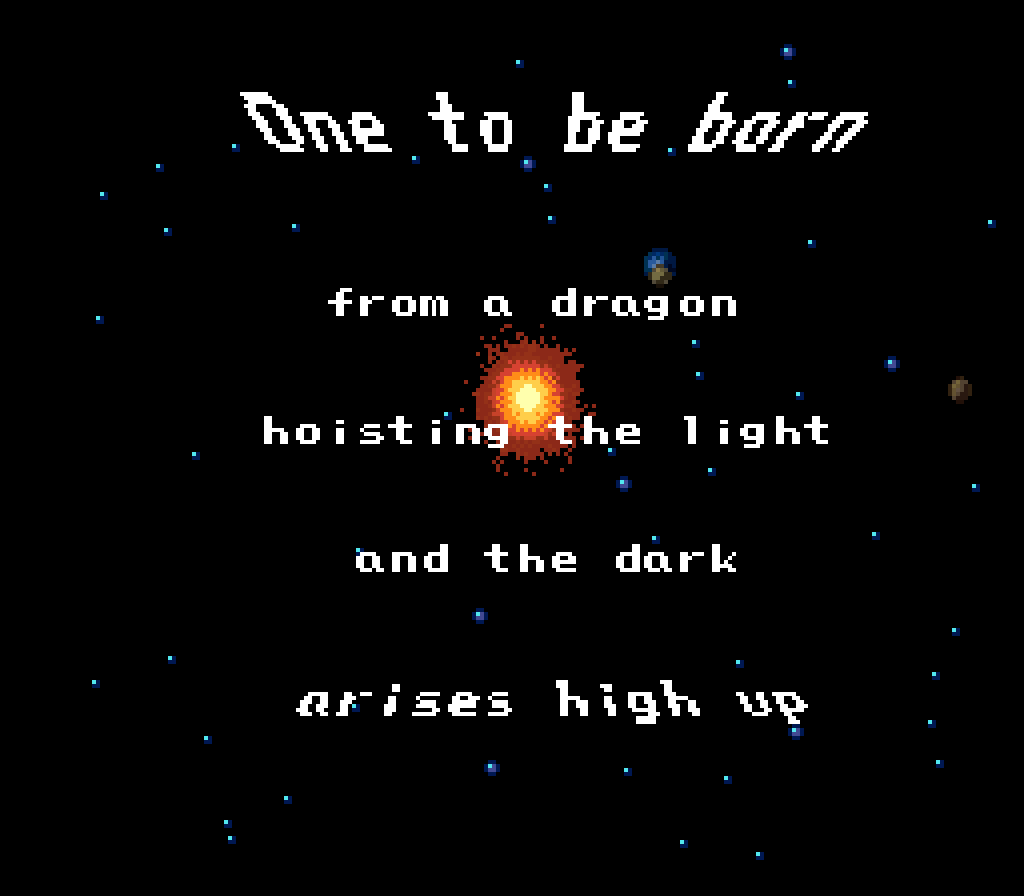
![press start to translate [Final Fantasy IV] press start to translate [Final Fantasy IV]](https://legendsoflocalization.com/wp-content/uploads/2019/08/bbenma.png)
“I’m not quite sure why Tellah chooses to call the bard a “swindler” in the English version, either. I guess maybe you could see it that way, but it just doesn’t feel like a natural word a native English speaker would’ve used there.”
I feel like this actually makes more sense than the Japanese, but I’m not sure how intentional it was. Seeing as you’ve just seen the Red Wings bomb the crap out of Damcyan, it’s odd for Tellah to accuse Edward with ‘you did this to her’, but the English dialogue has more of a sensation of ‘you stole her away and now look what’s happened’. Since Edward and Anna eloped due to Tellah’s disapproval of Edward, and Anna was put in a position to be caught in the bombing because of that, suggesting that Edward somehow deceived her or swindled her, resulting in her harm, I think works better than the more direct accusation.
(The huge necro is because I’m rereading these in preparation for streaming some of the older games and I want localization trivia to talk about.)
>Actually, Japanese fans have favorite quotes of their own – we’ll look into those at a later time if I don’t forget.
Did you ever do this? I assume #1 on the list would be Golbez’s いいですとも!
Actually, there is another reference to the ‘spoony bard’ line in Final Fantasy Tactics A2: Grimoire of the Rift. It’s during the second half of the game, and is used to describe a Seeq in one of the cut scenes. Unfortunately, I don’t have a screenshot of this line. You might be able to find it on a YouTube video, though.
My theory as to why they changed Gilbert to Edward is that they wanted it to sound more regal, so they went with one of the most common names for English sovereigns.
and here I thought they just simply gave Edge’s true name to Gilbert because at the time it was only in supplemental material